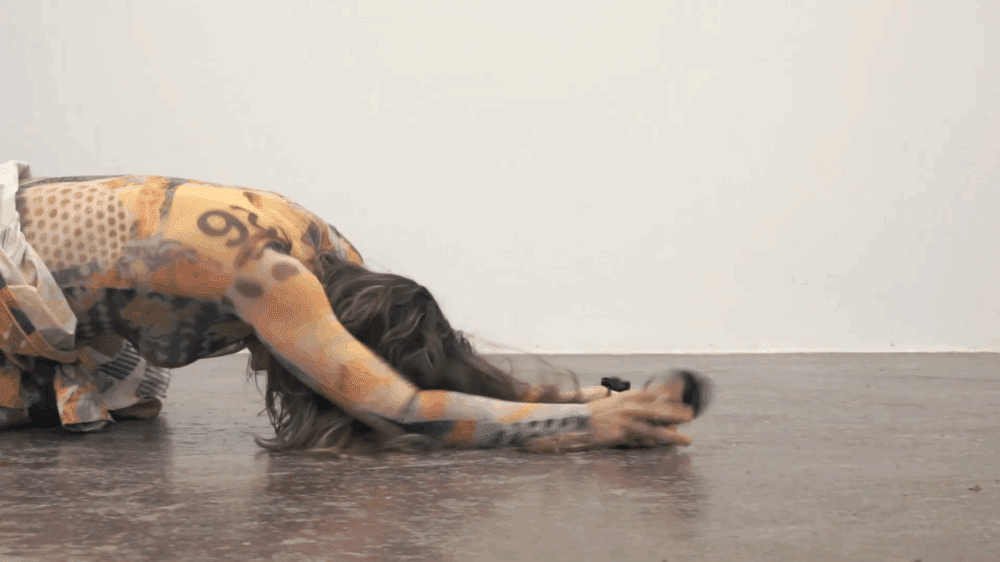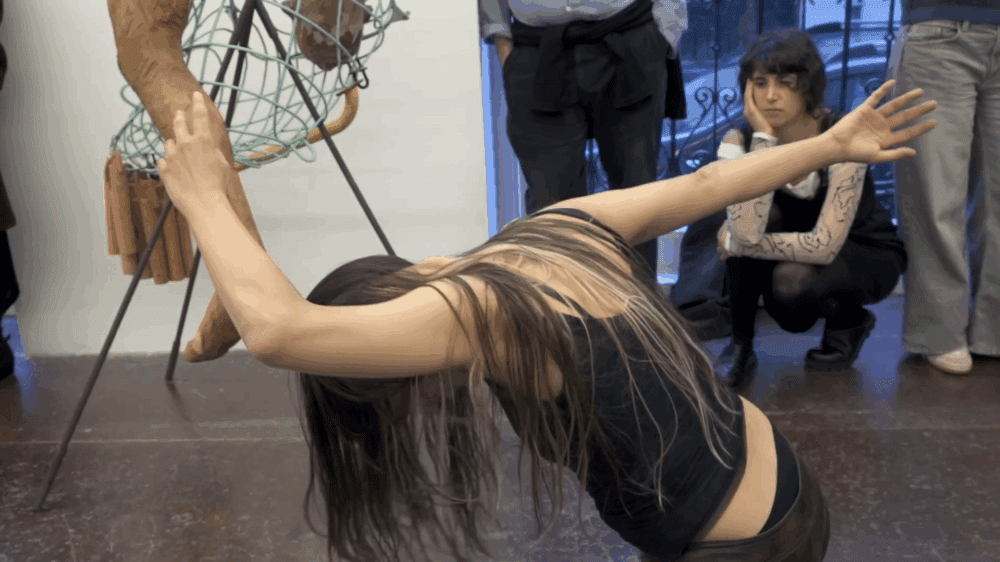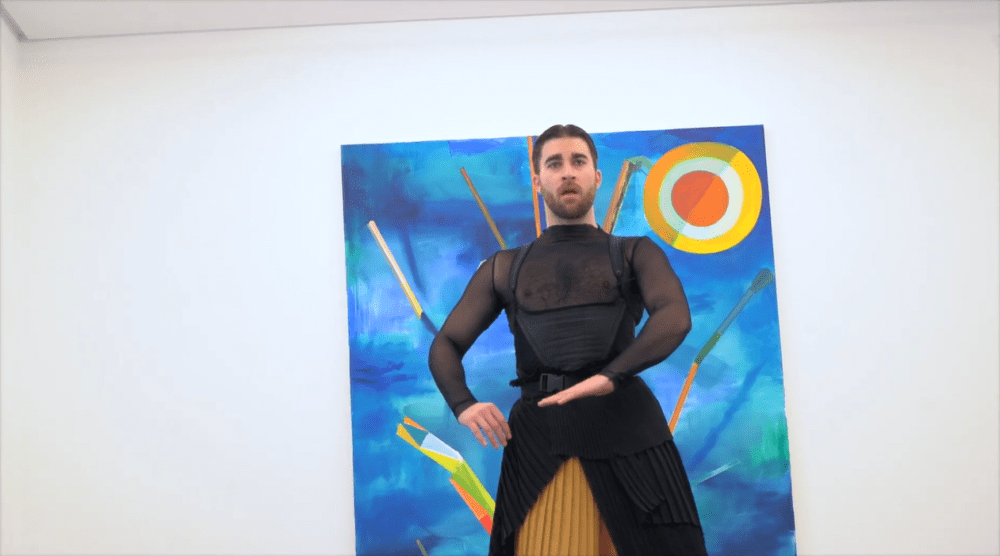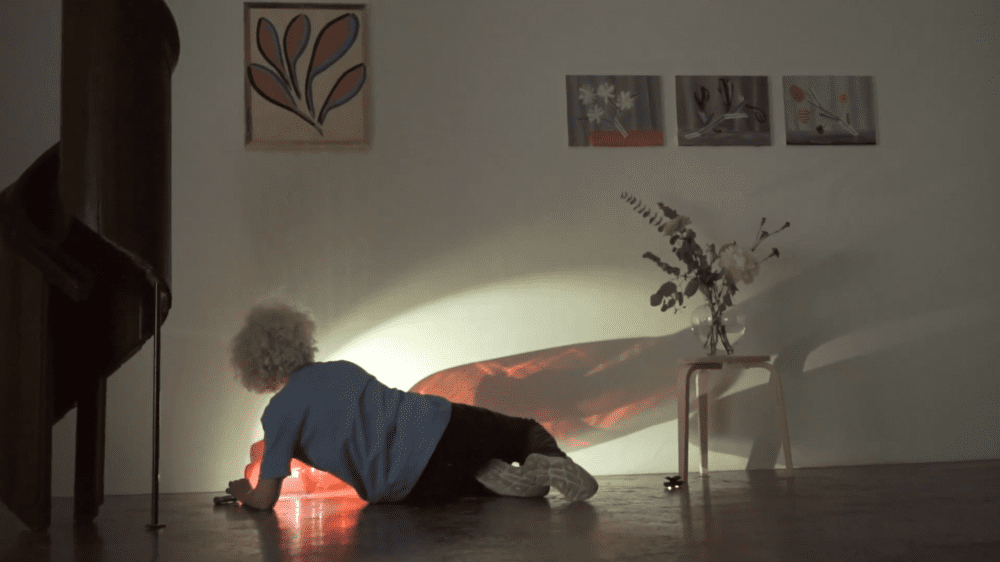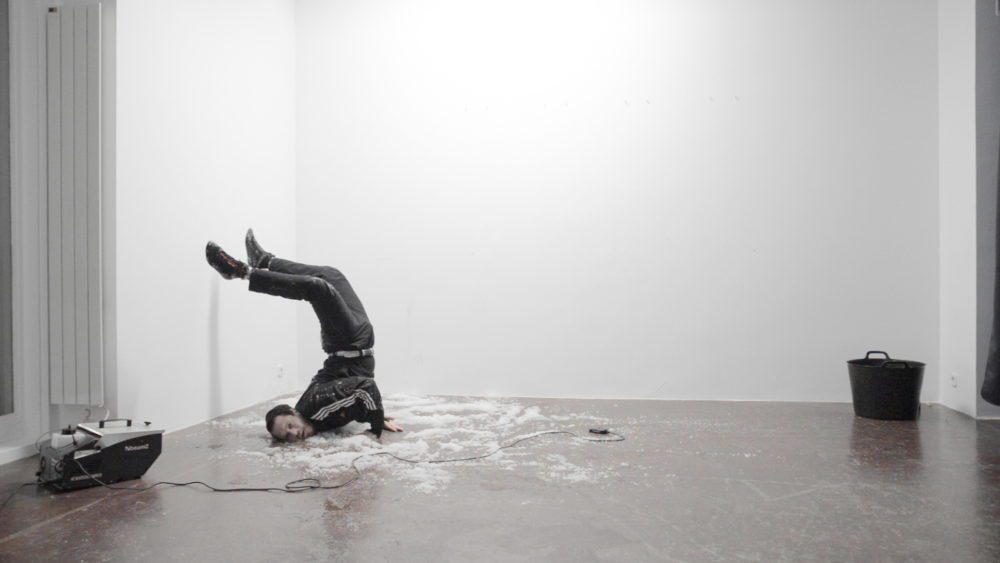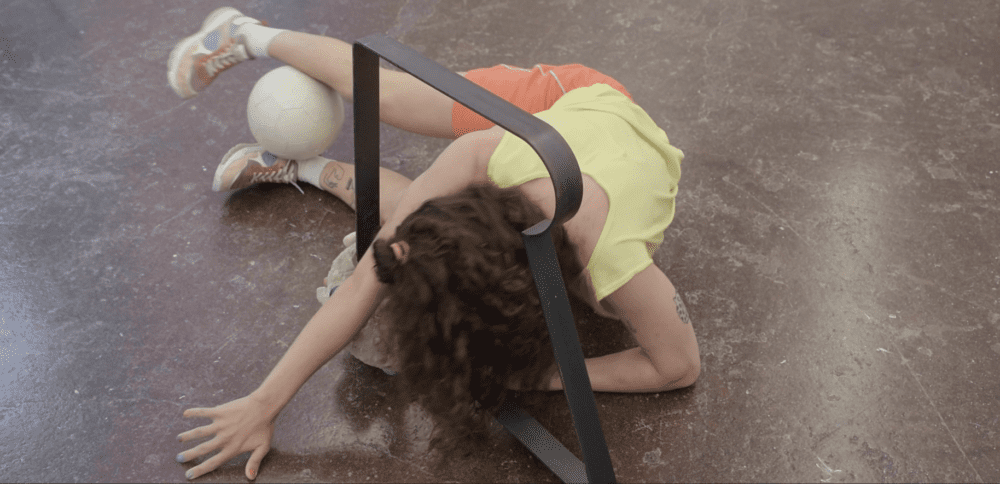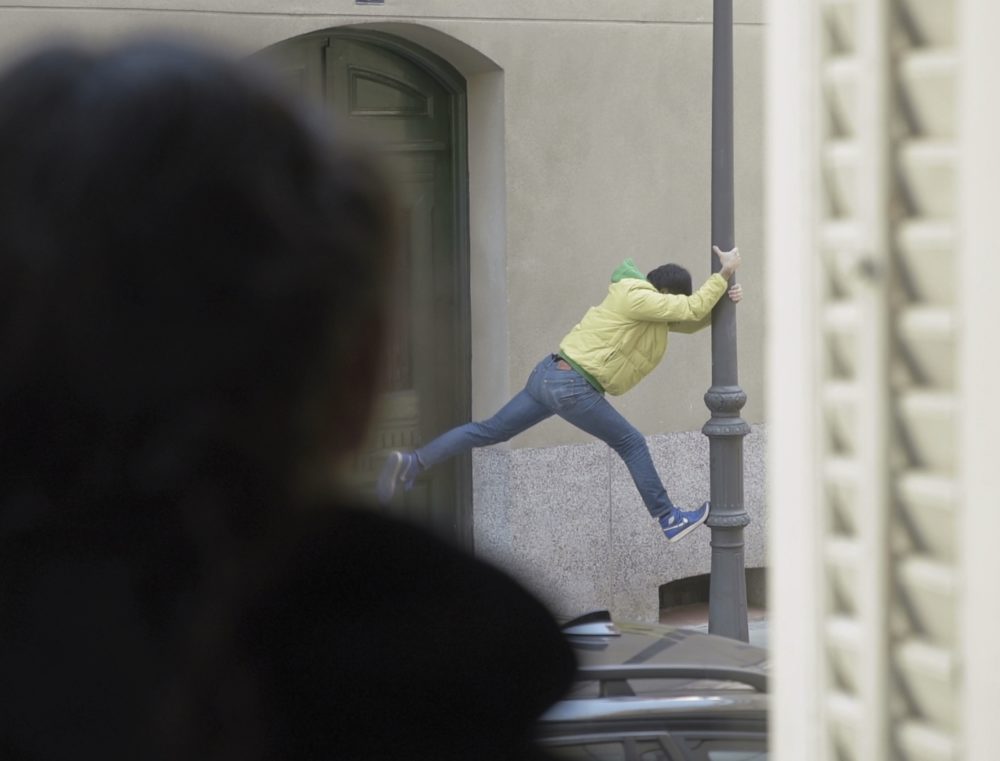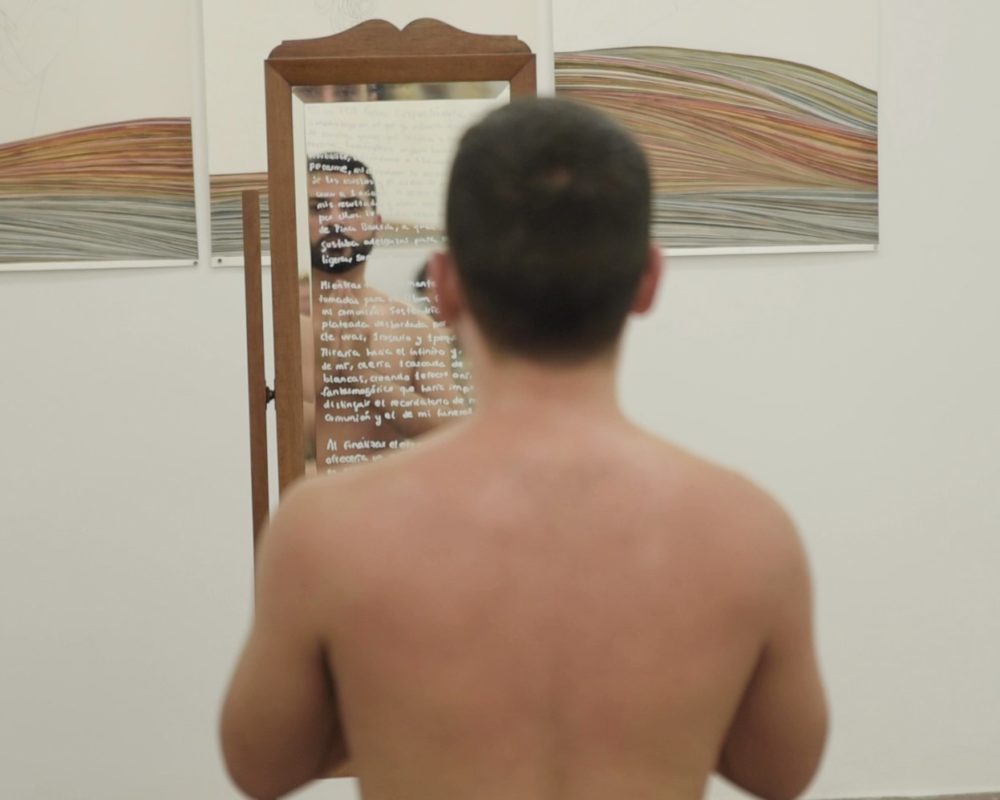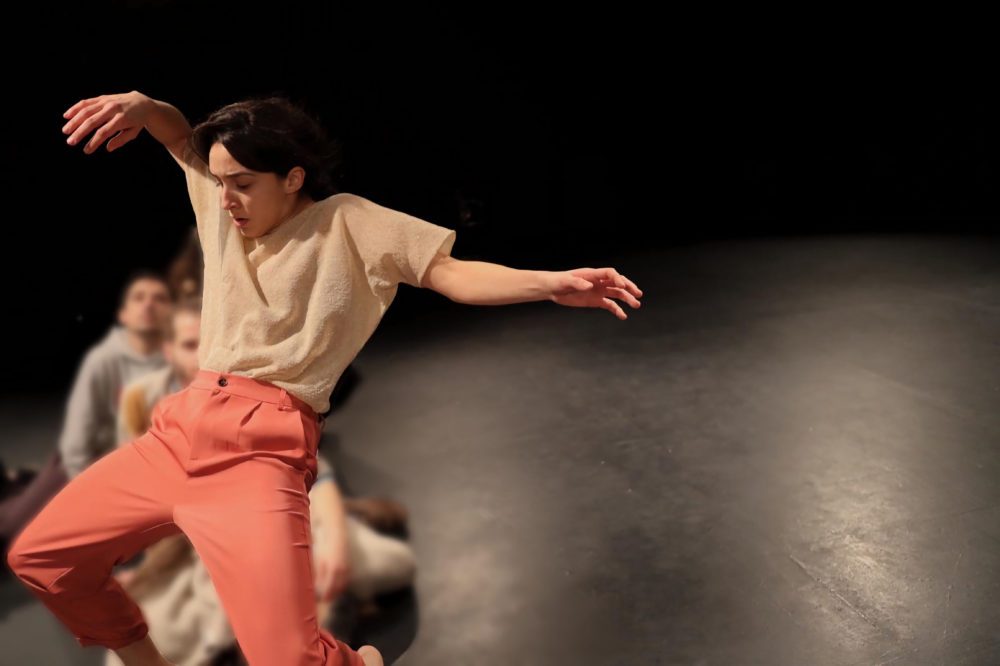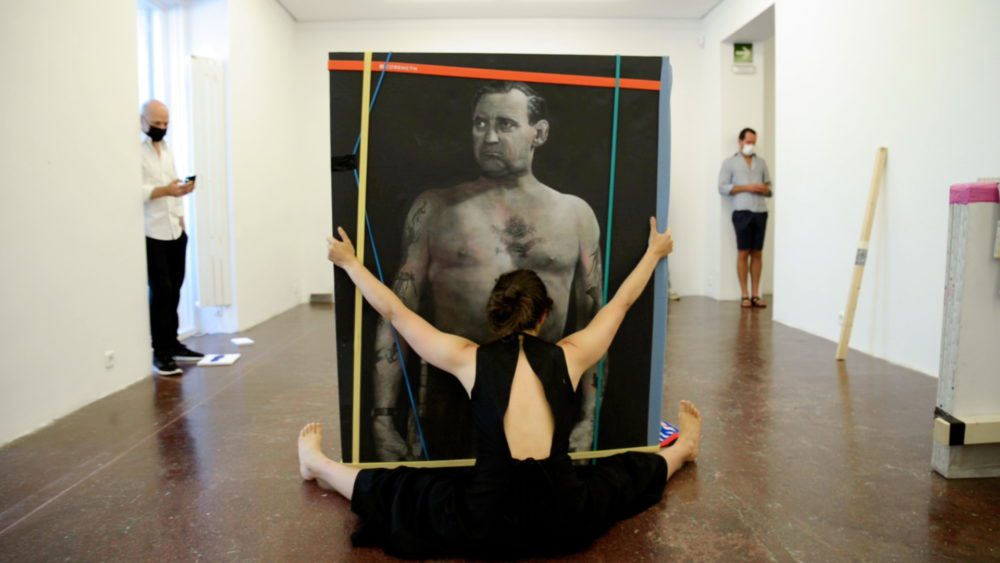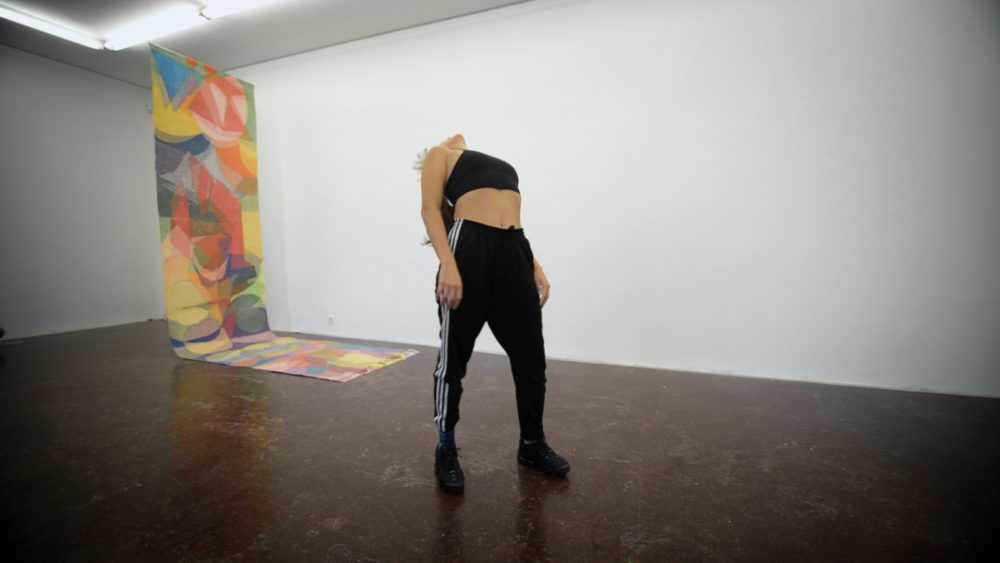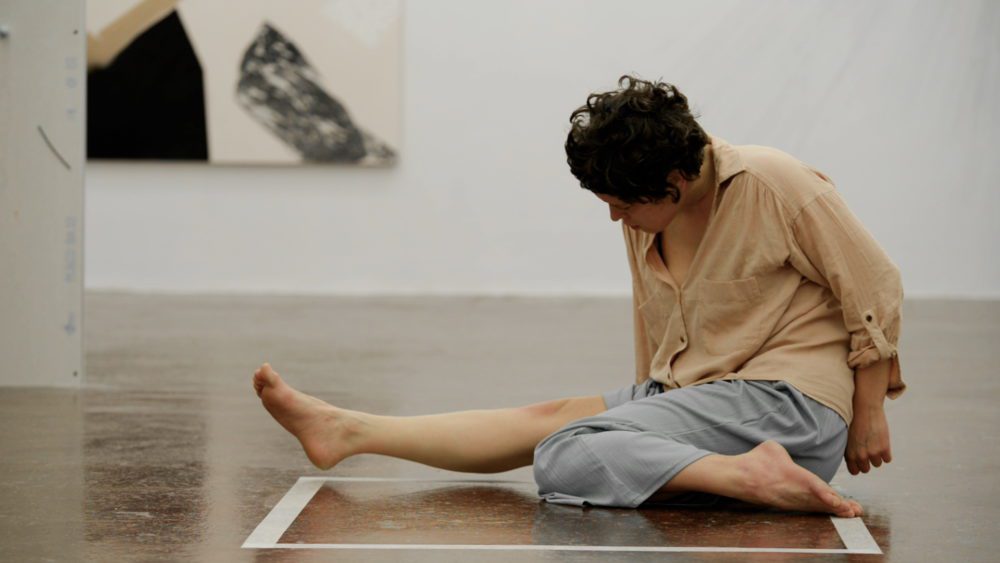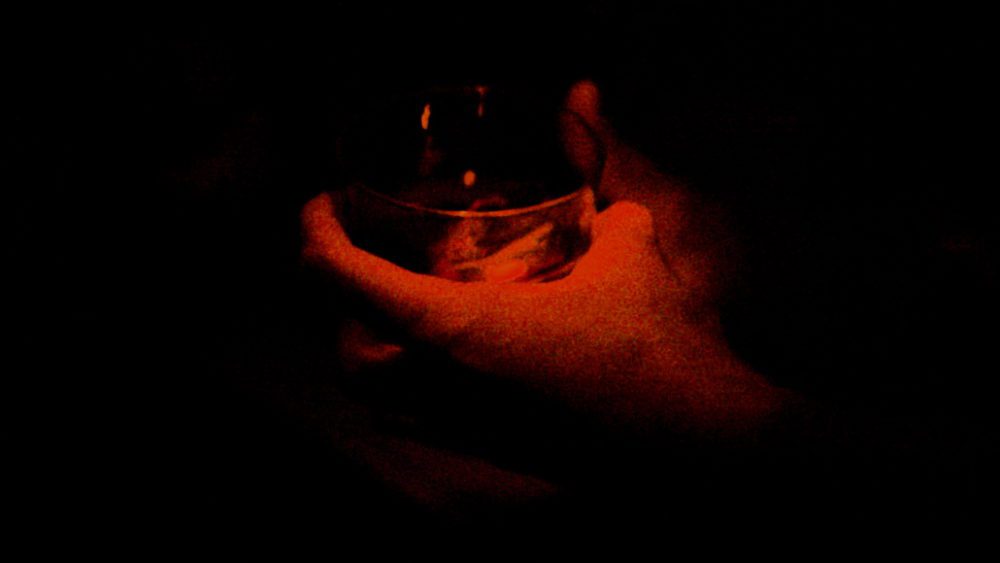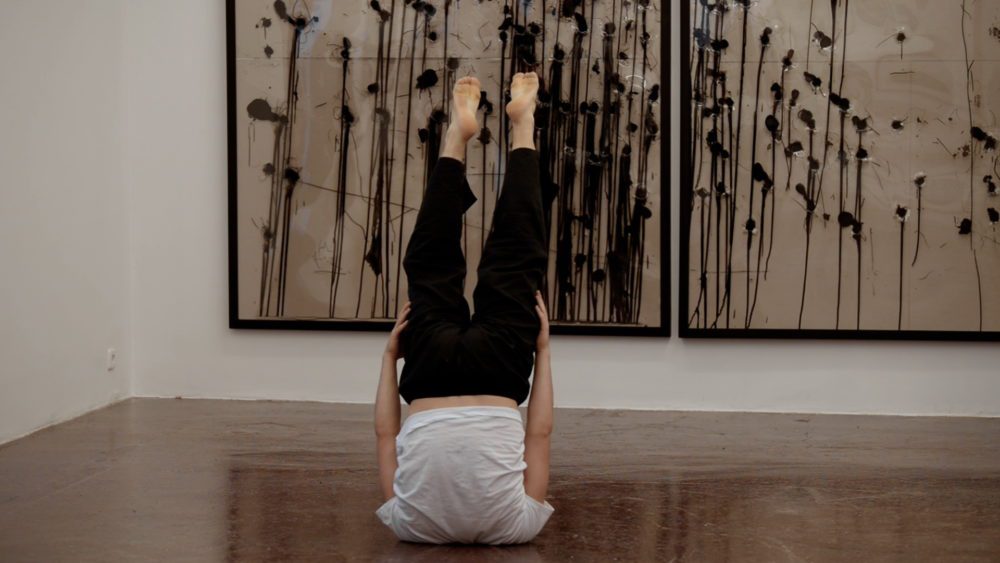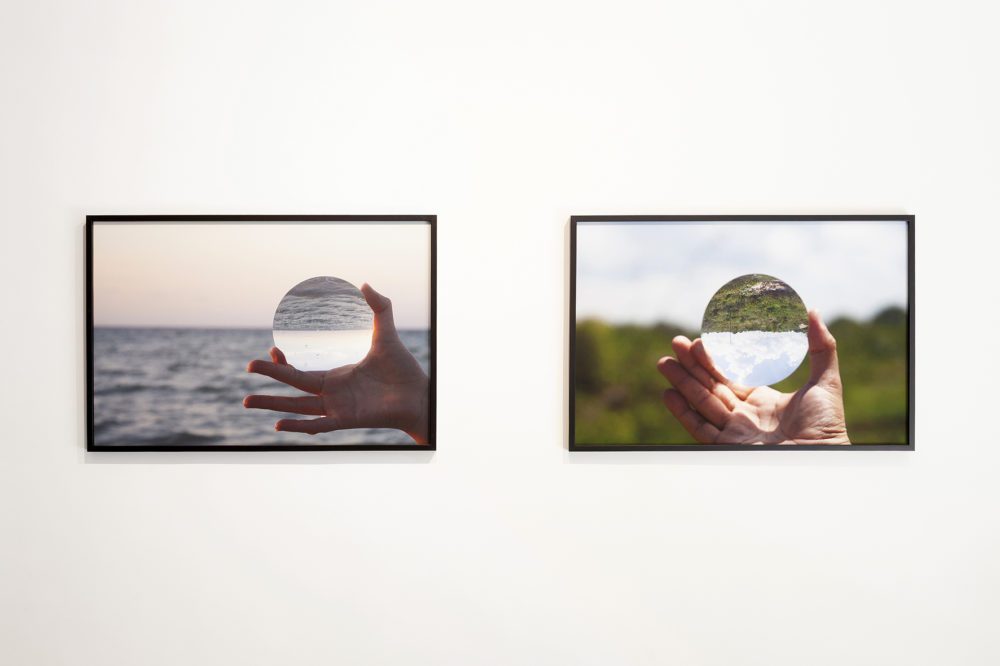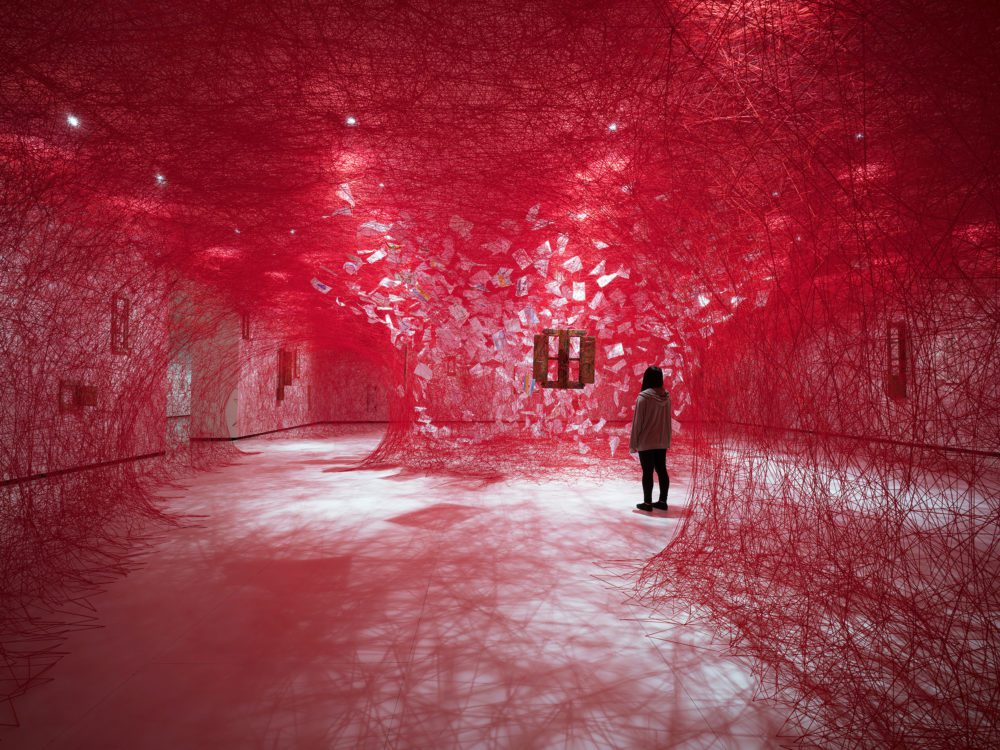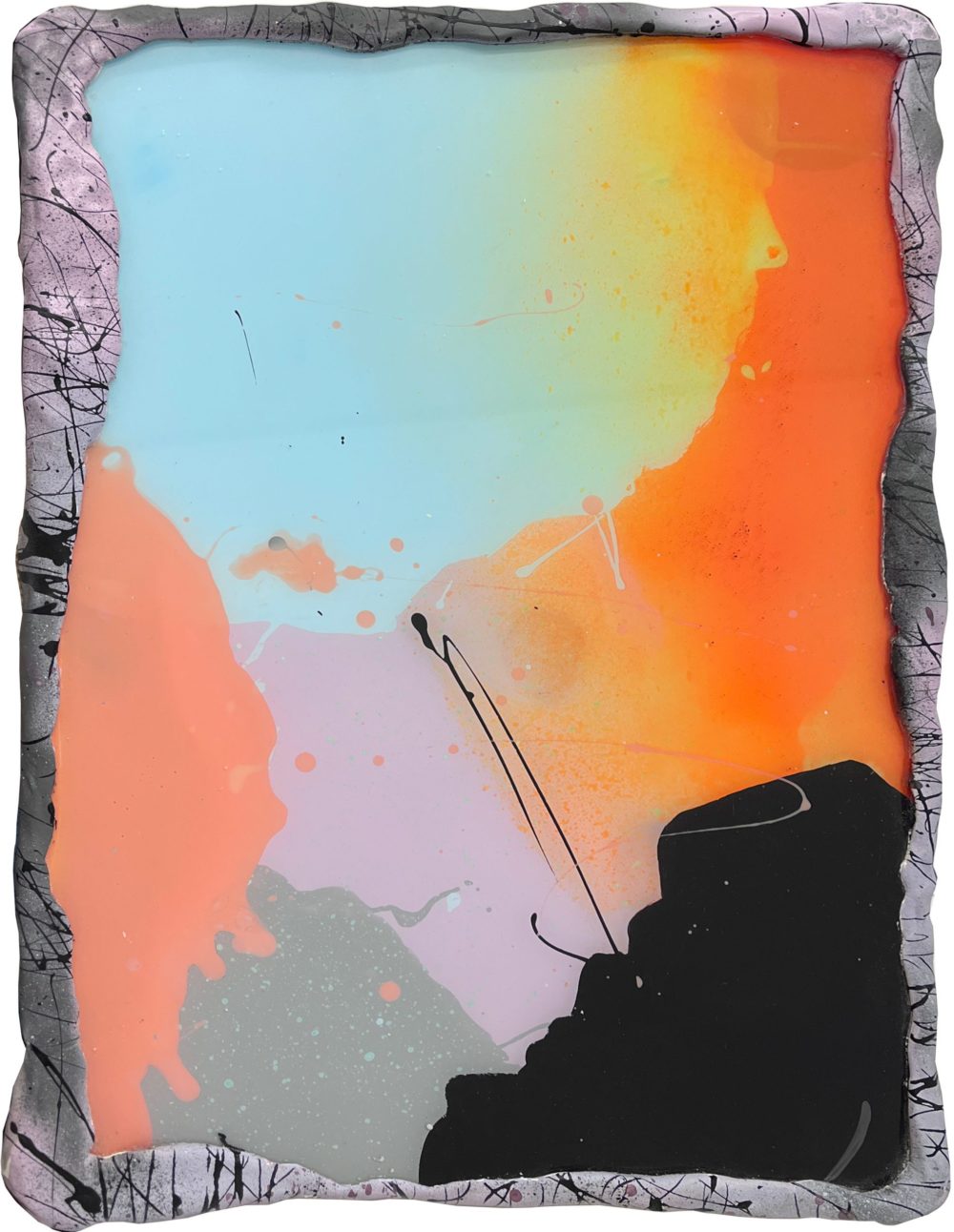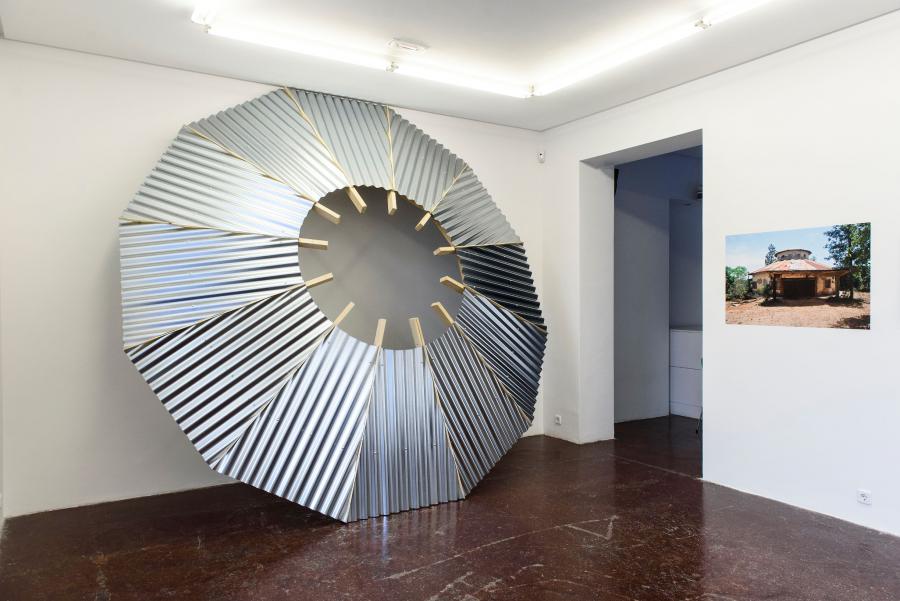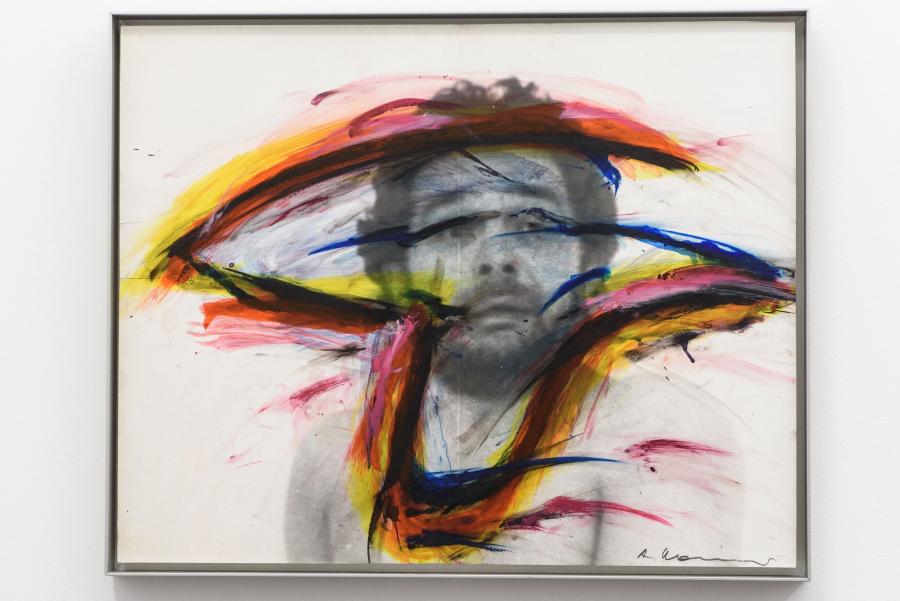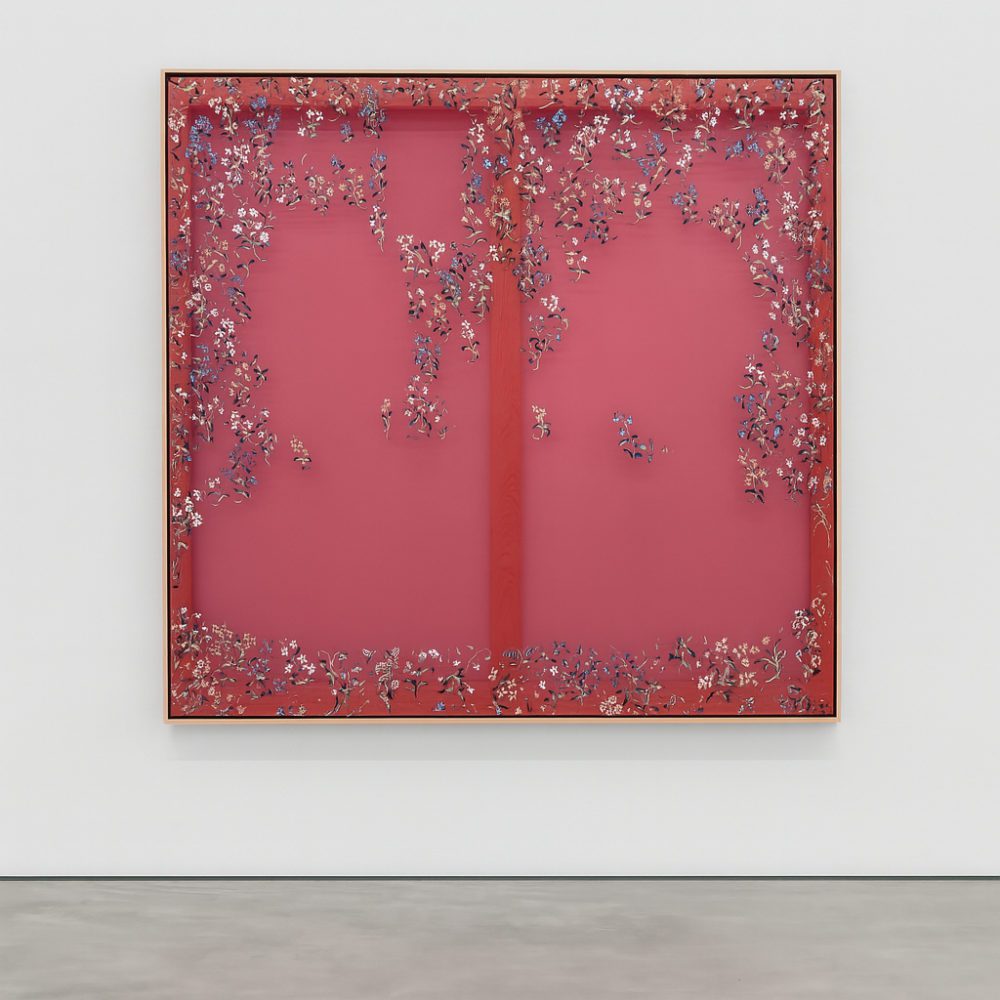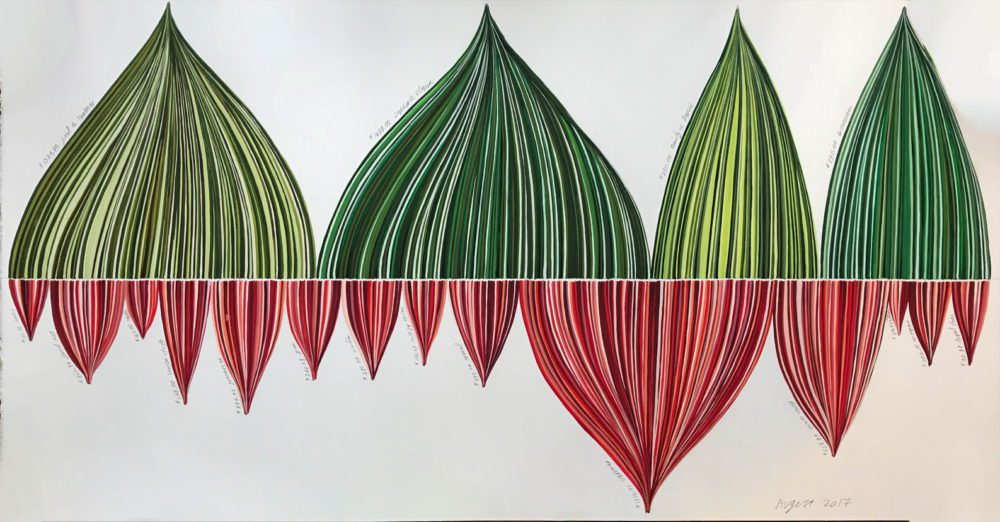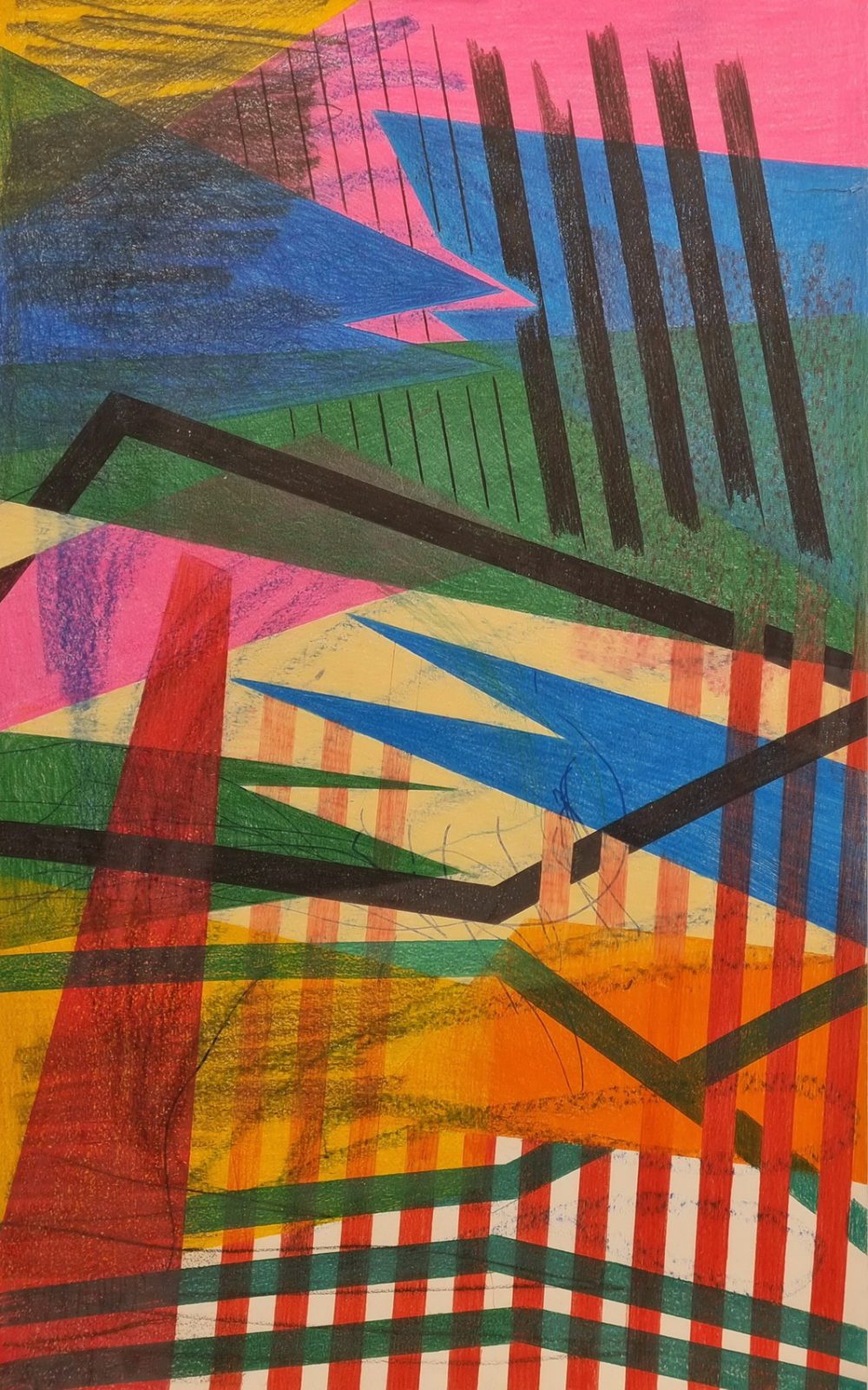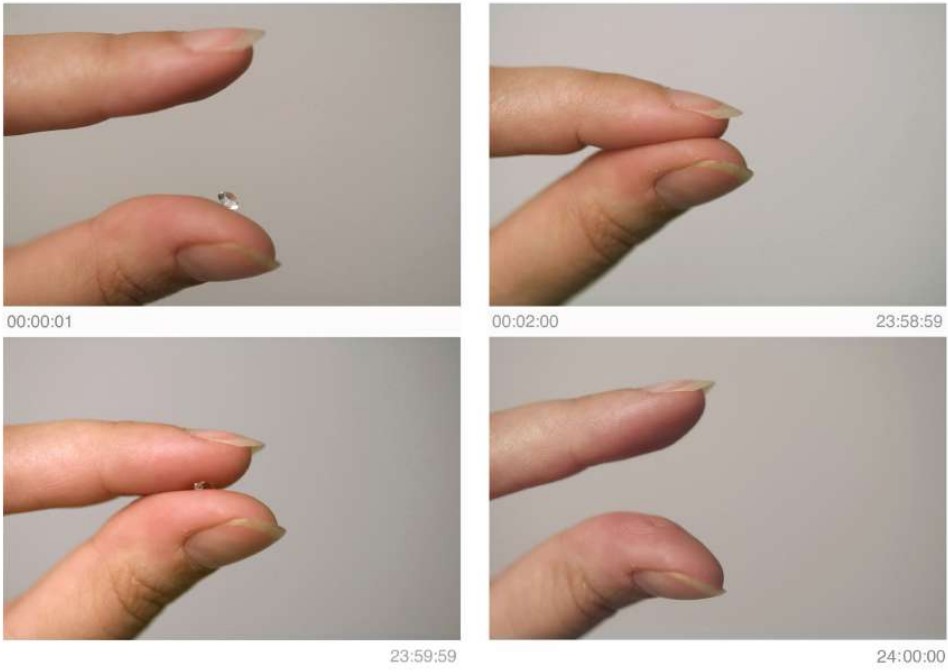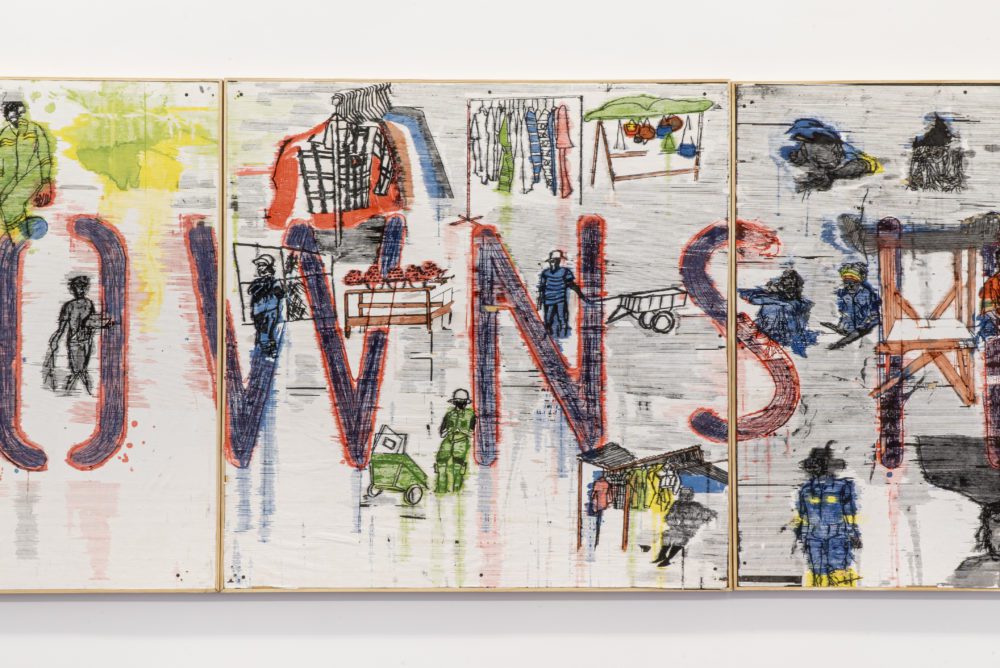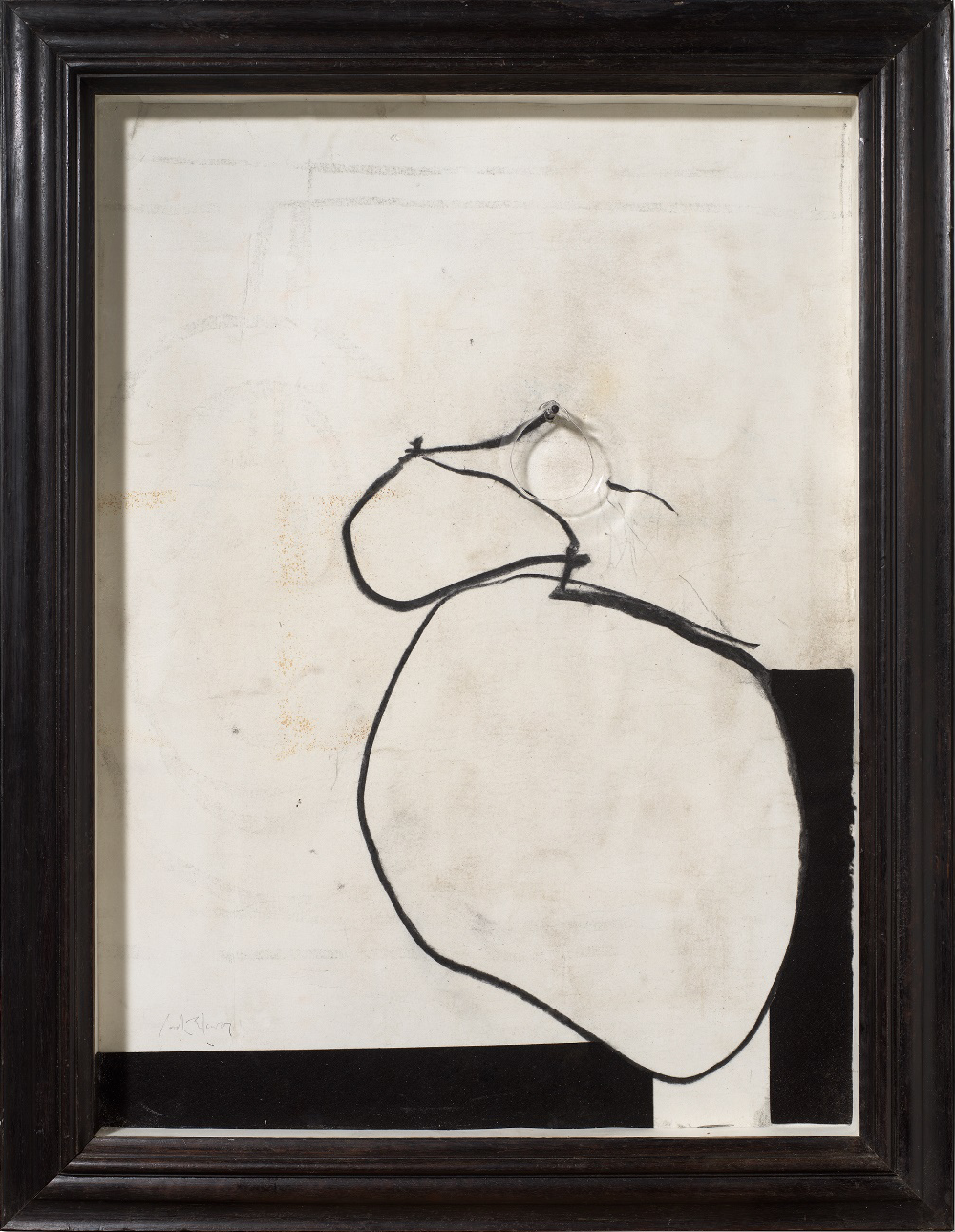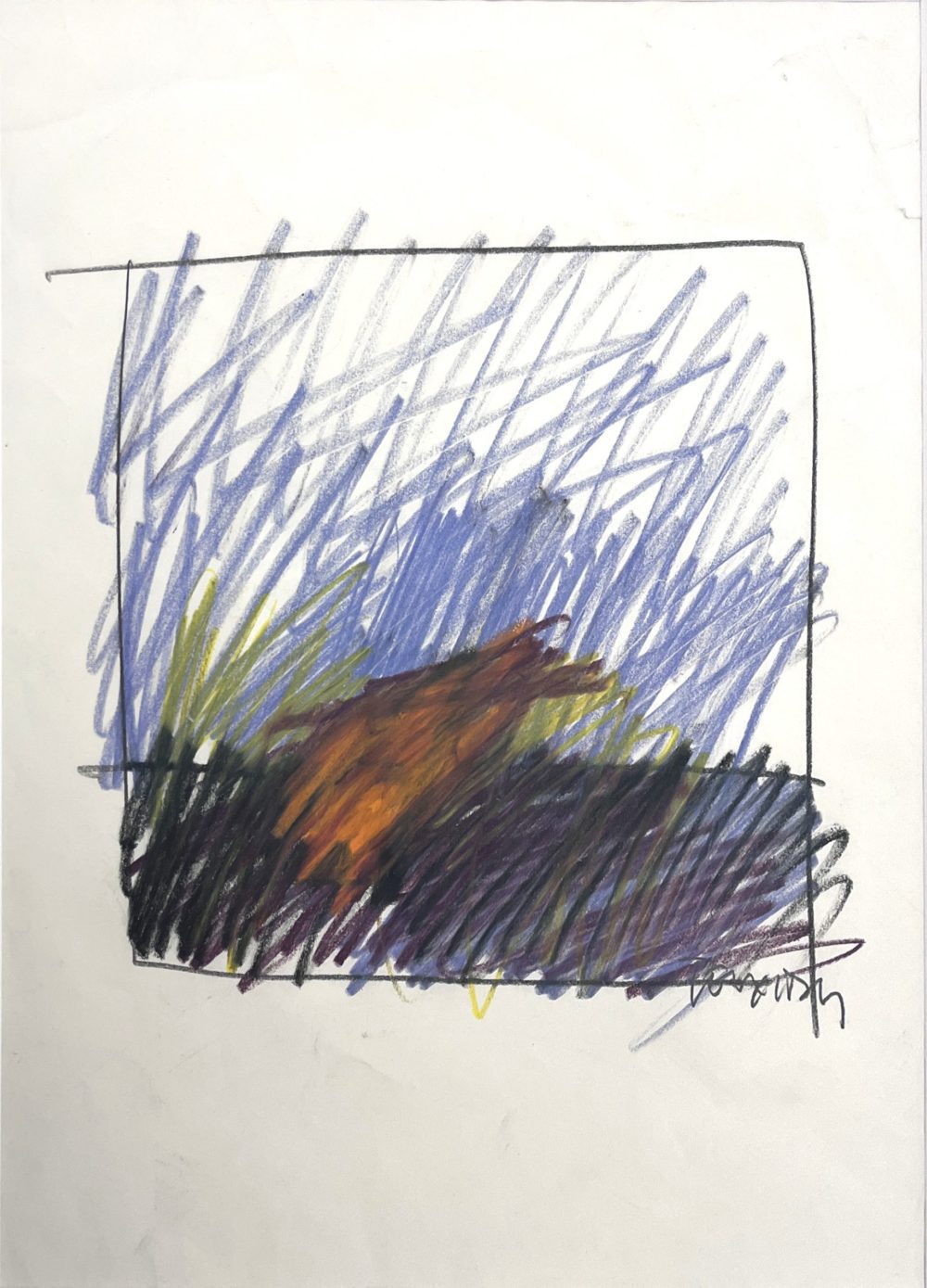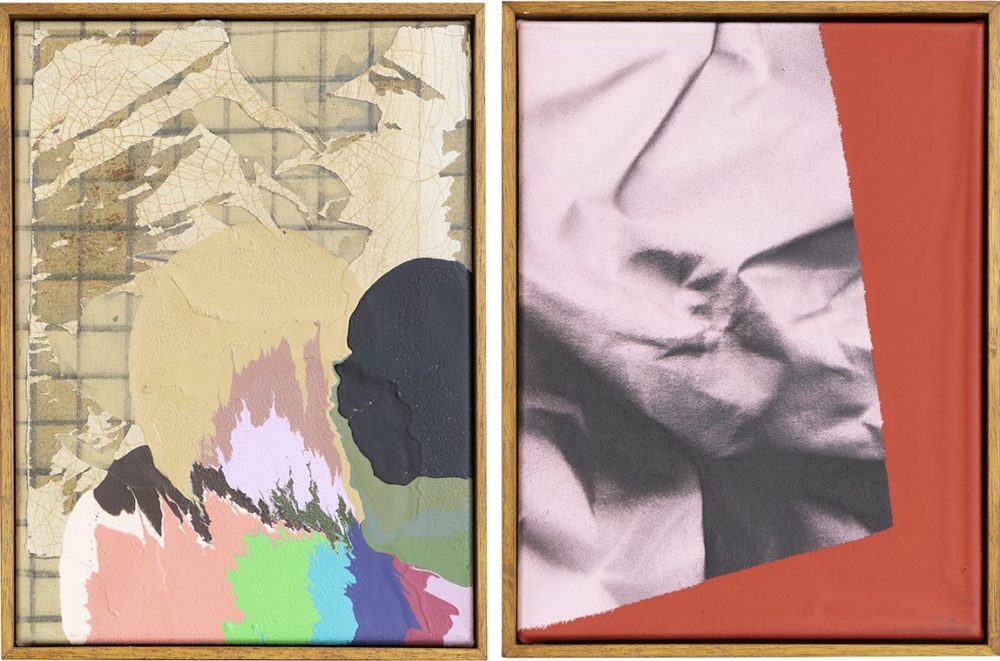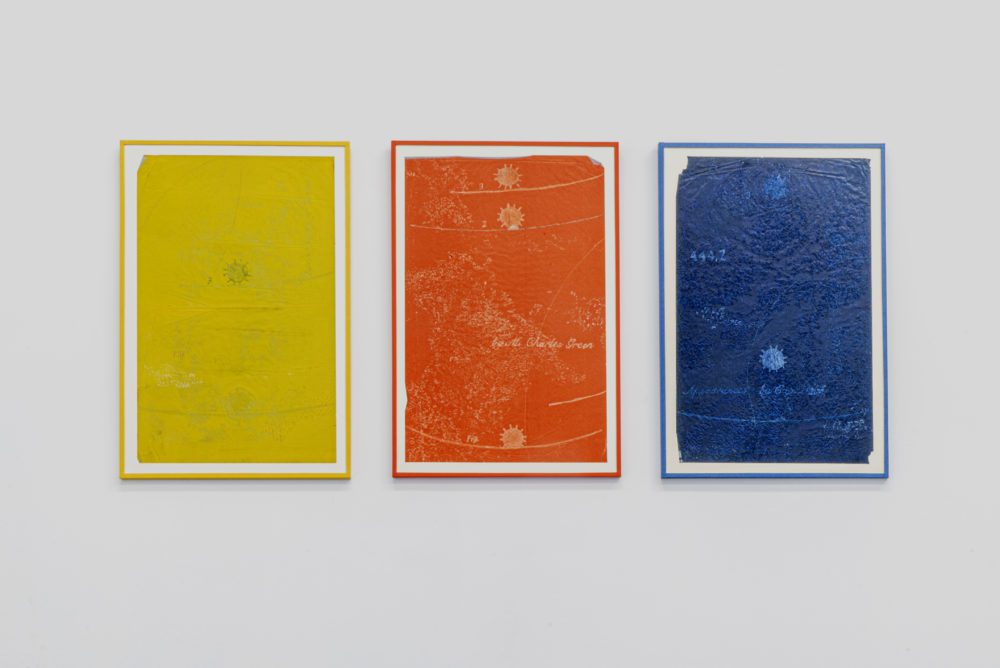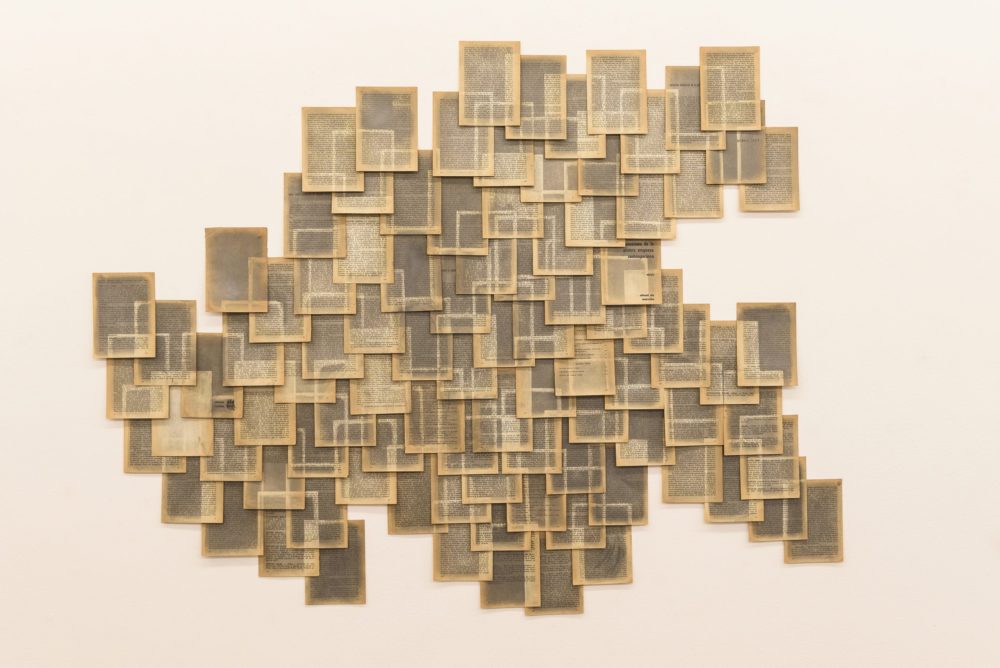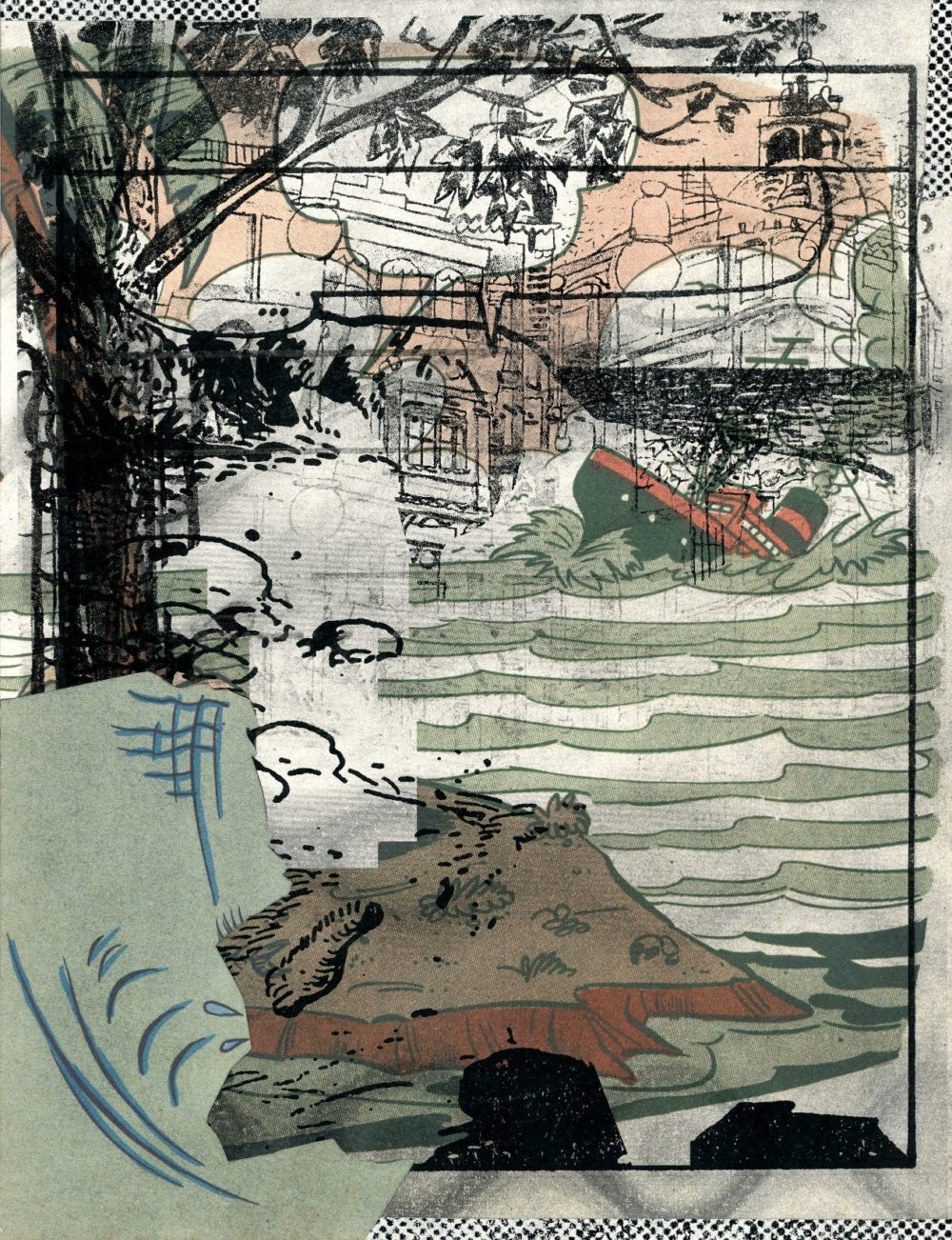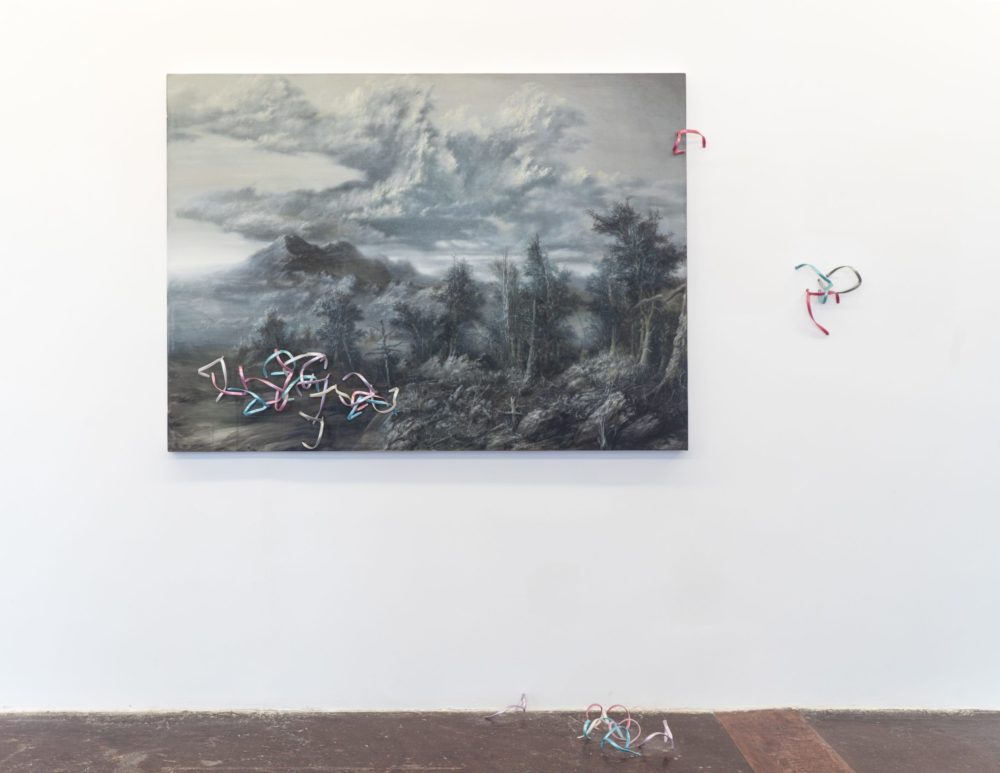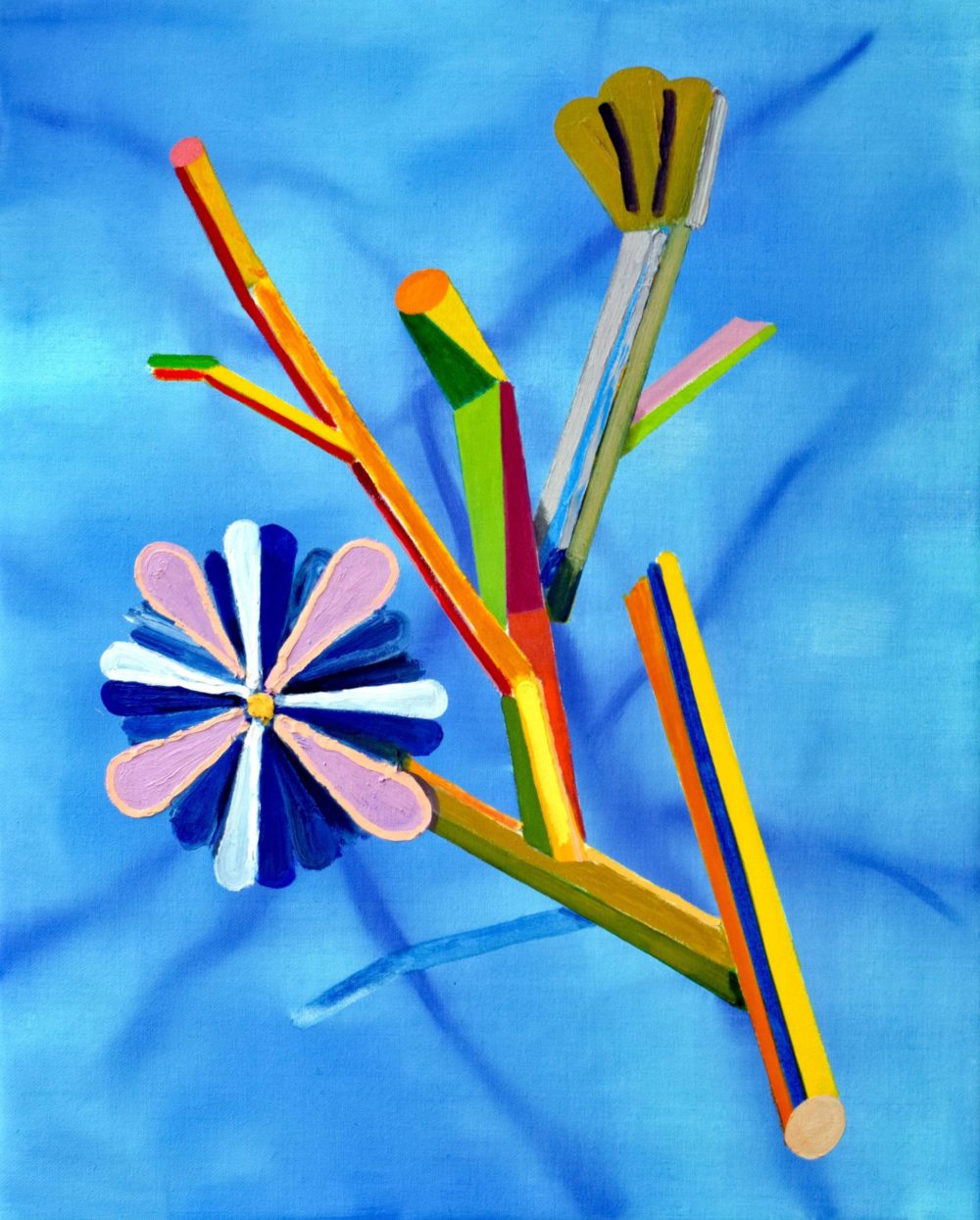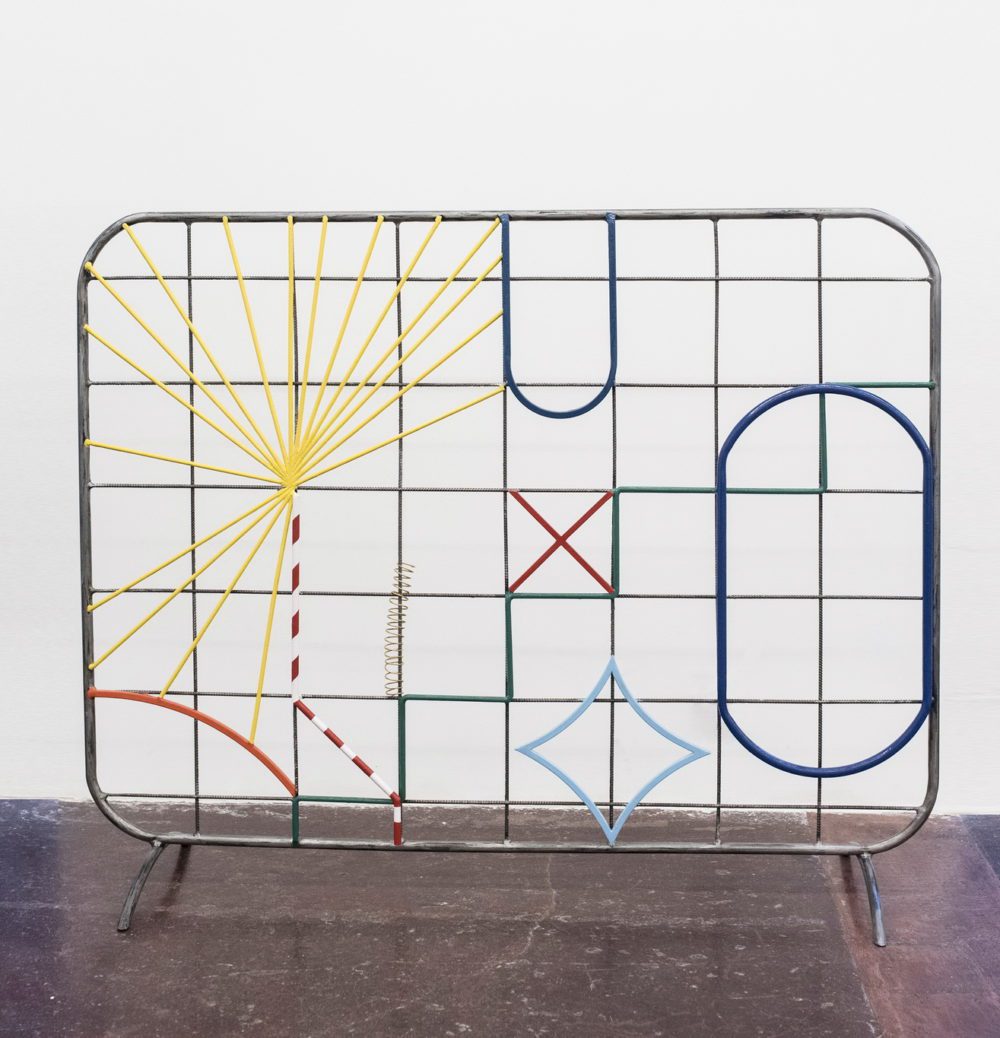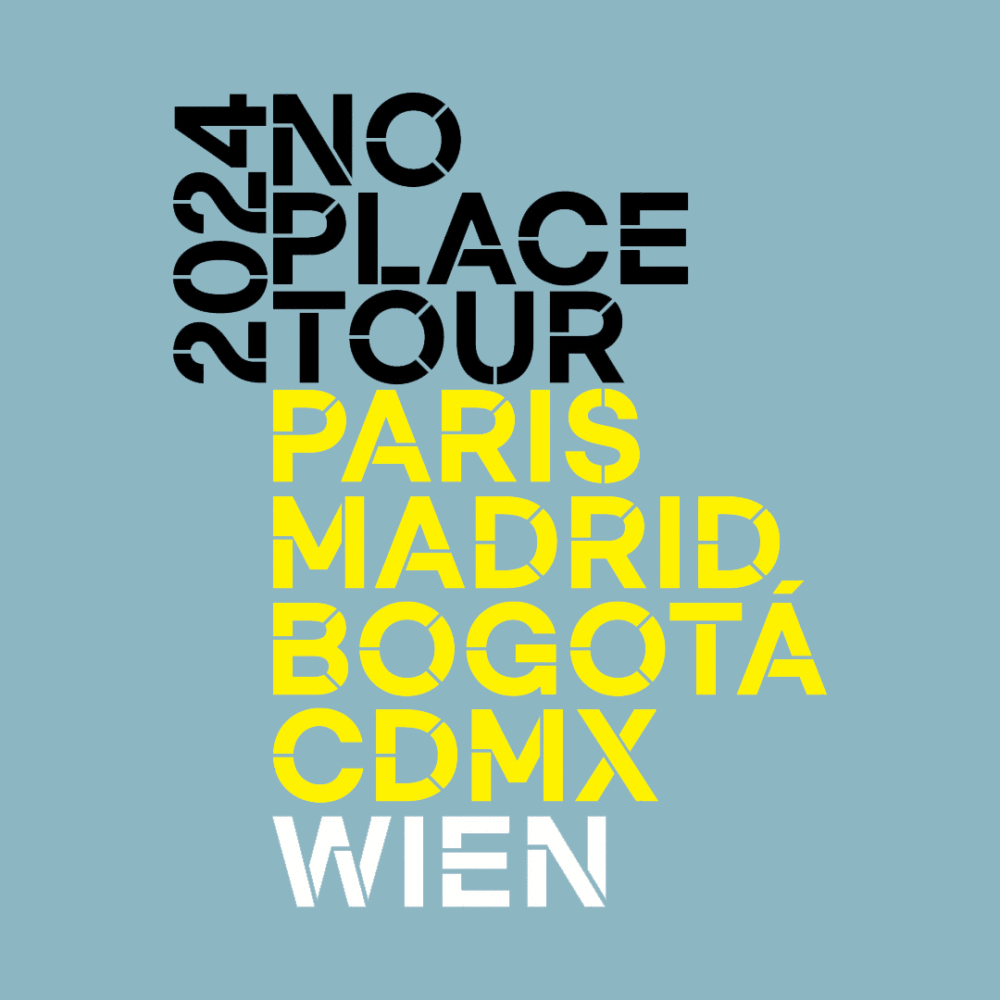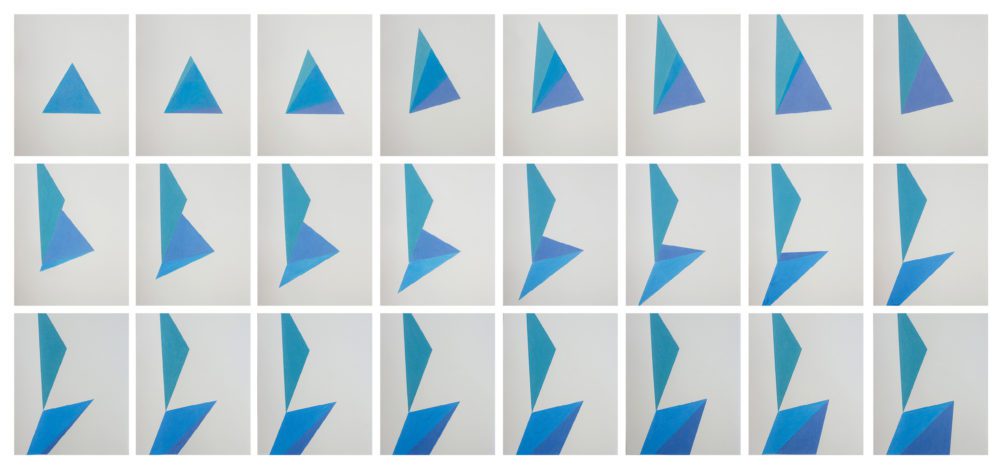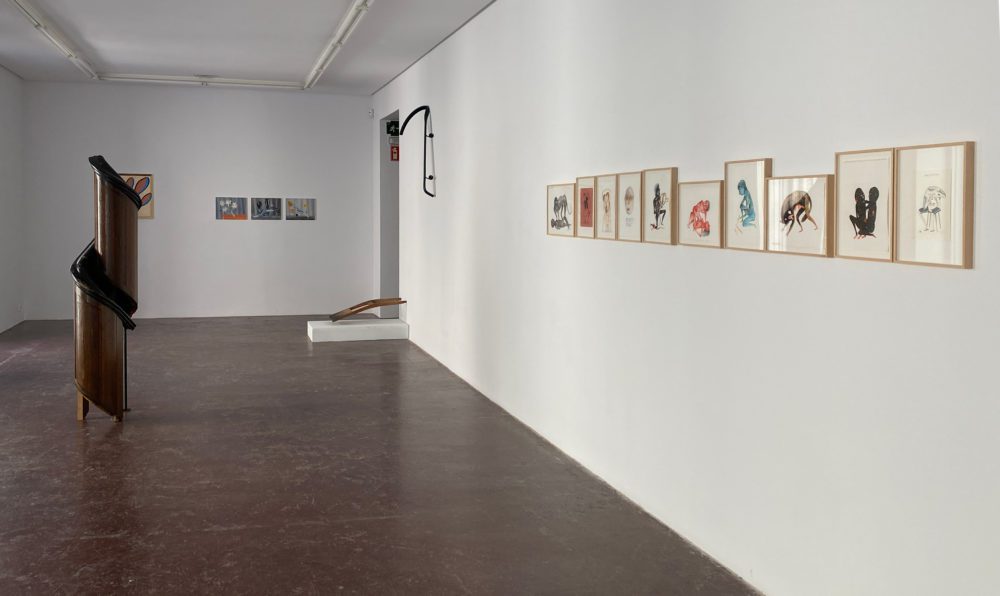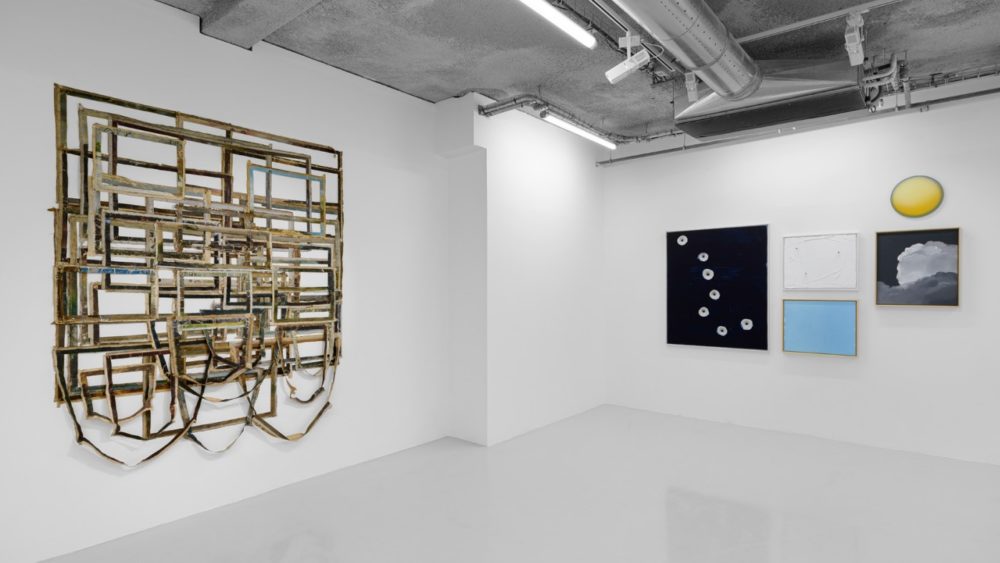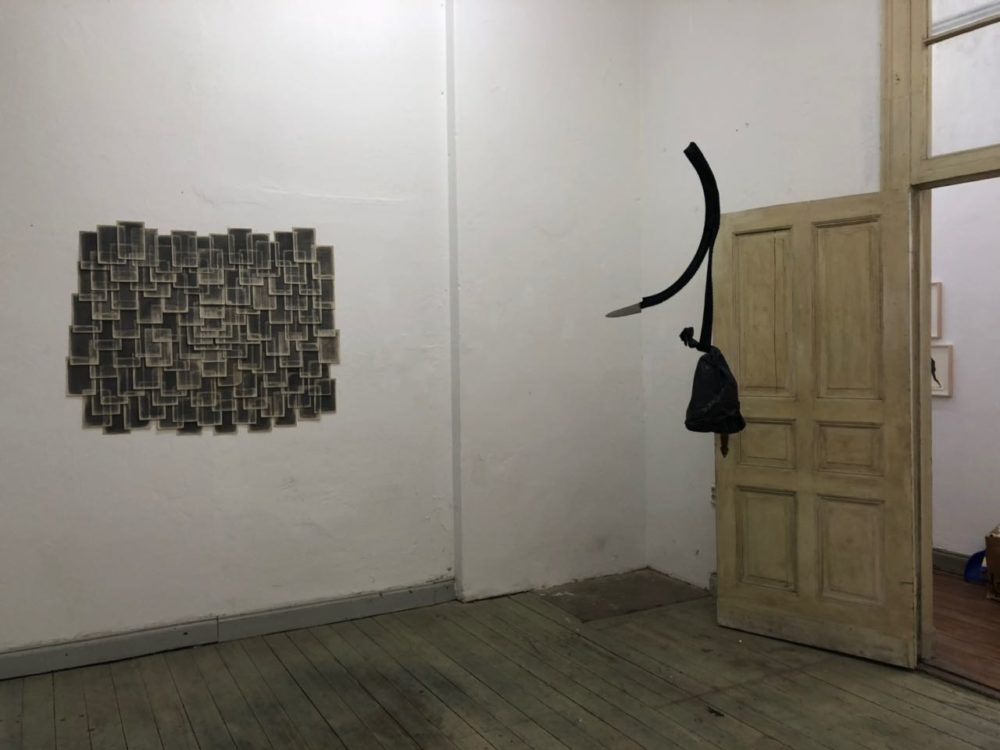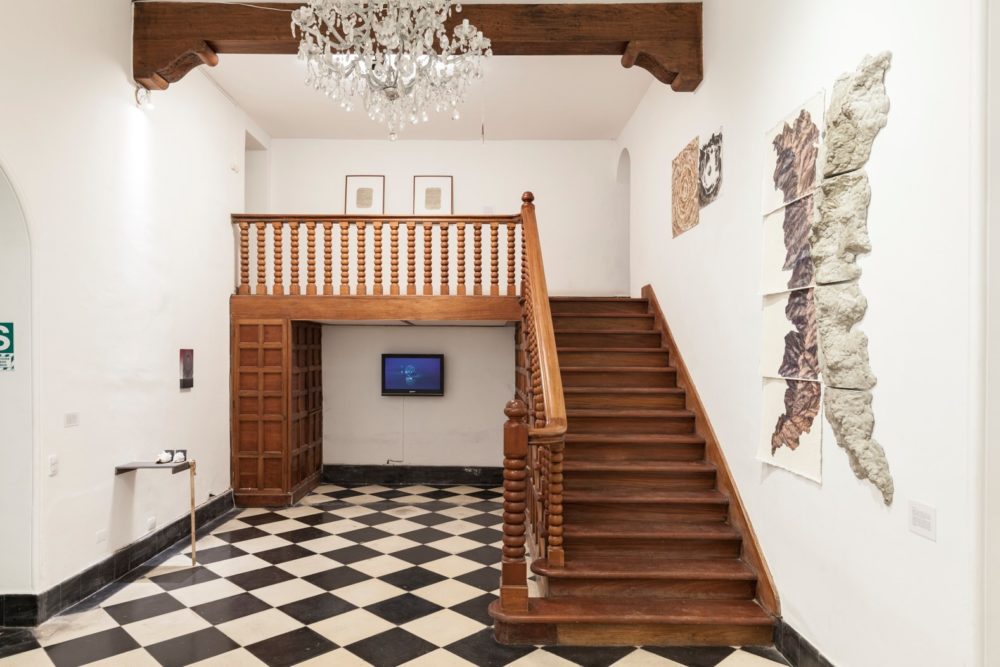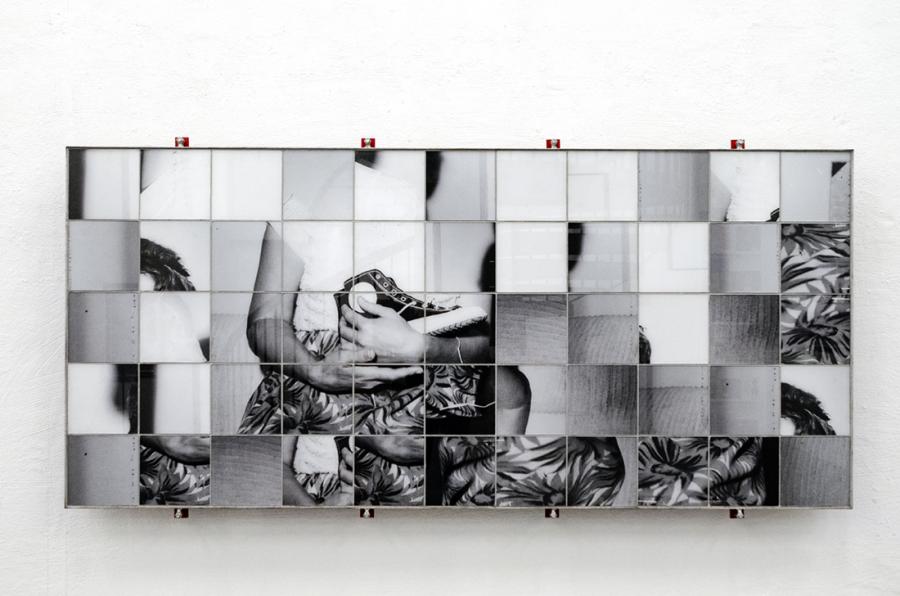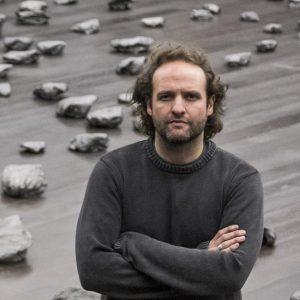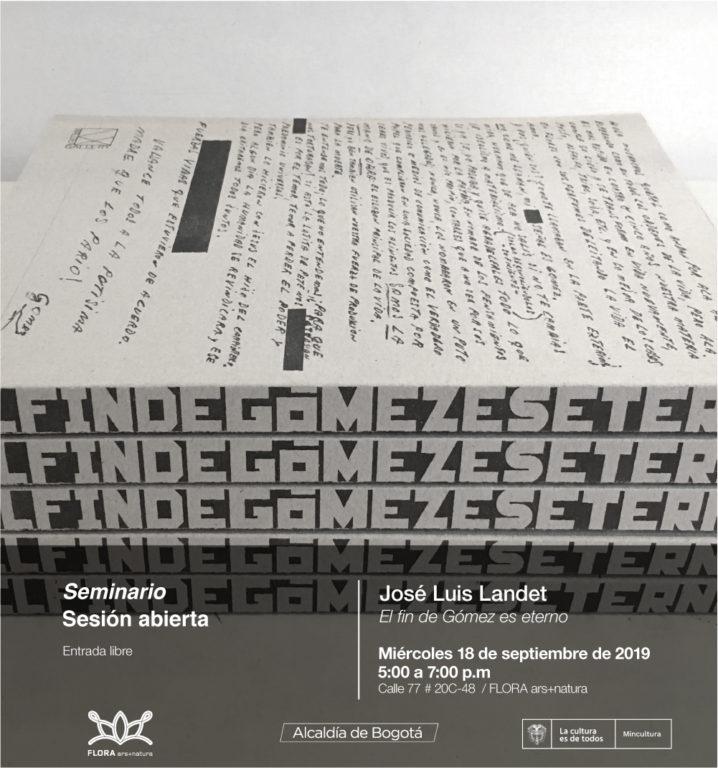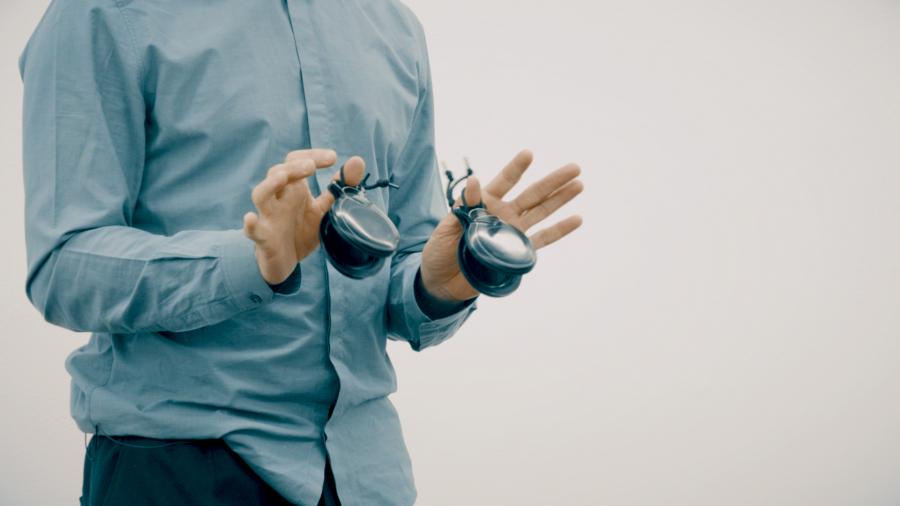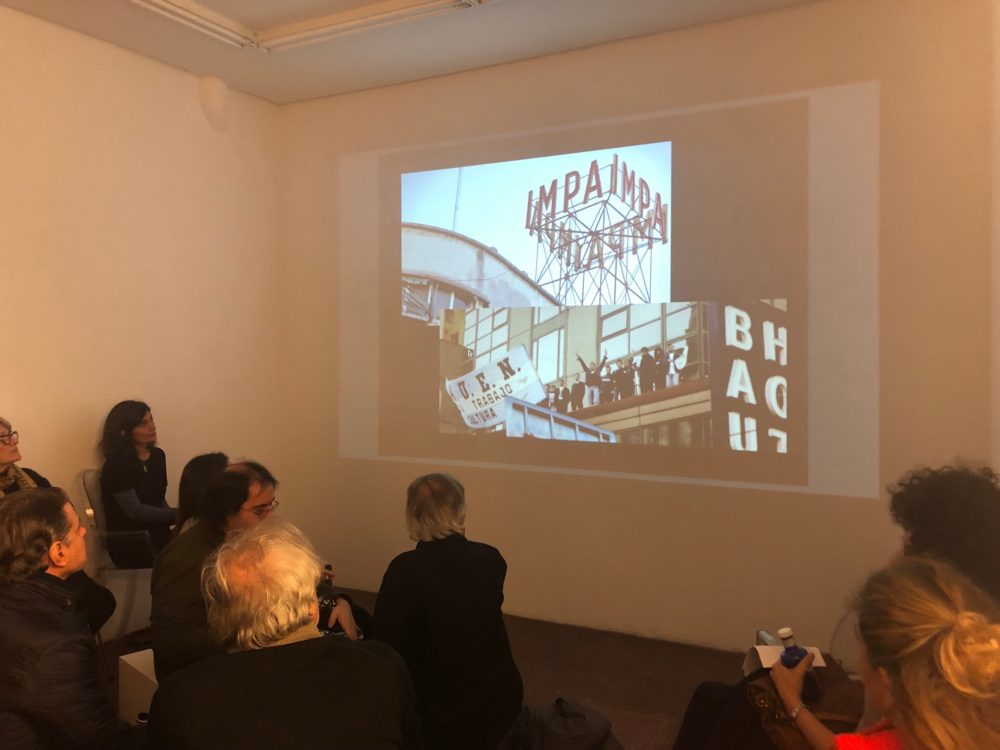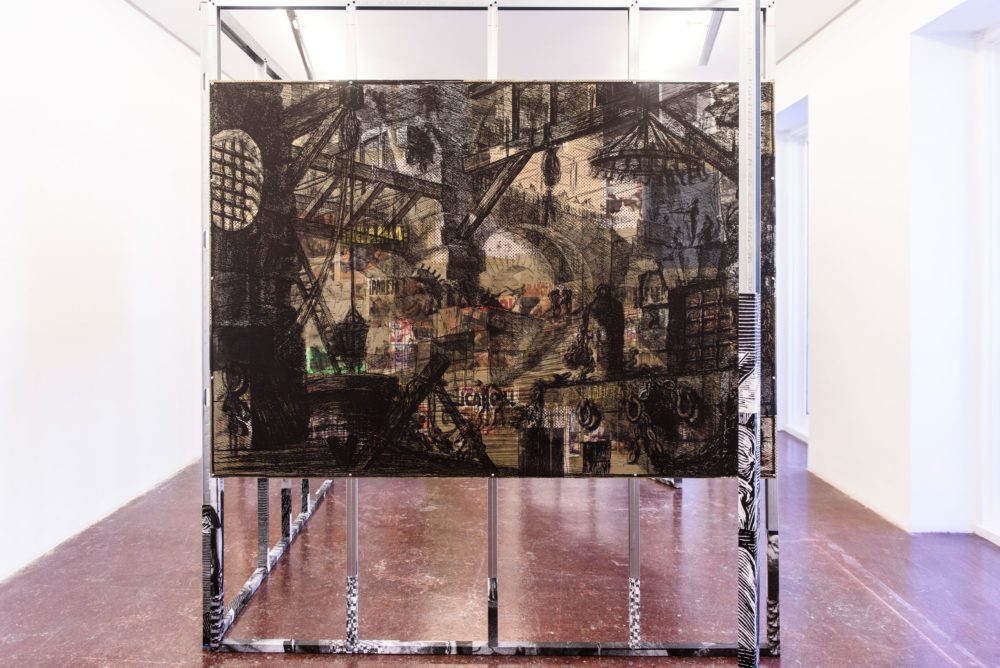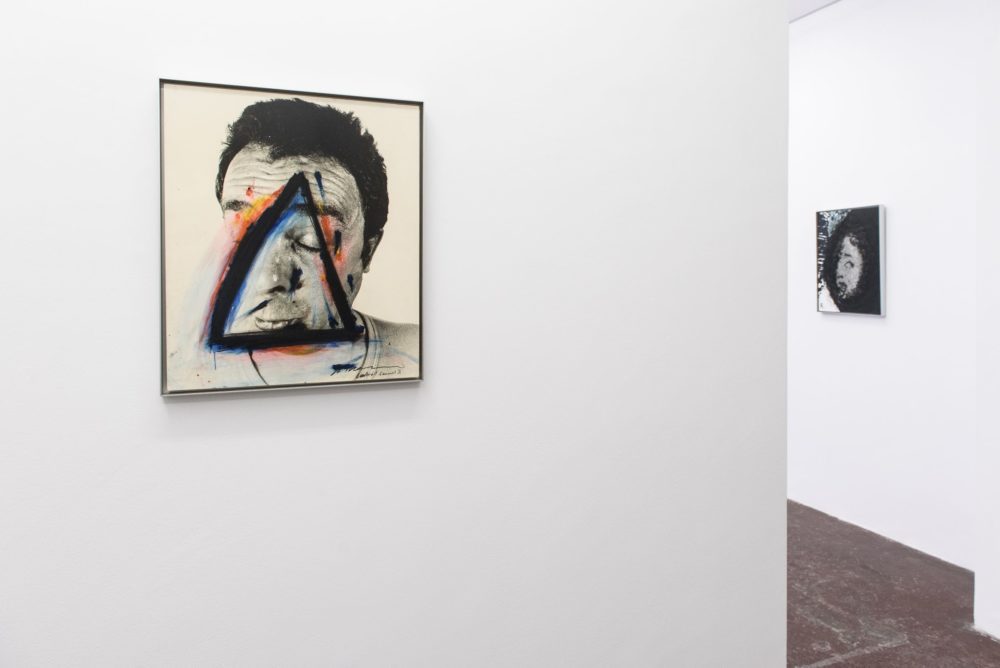Exposición /
LAURA F. GIBELLINI: LUNA DE BRILLO+DatesInfo
Luna de Brillo/ Shinemoon is a drawing on carbon paper in which I transcribe the title of a painting made by my daughter Maya as she wrote it on the canvas itself. This title gives name to an exhibition and also to the book that accompanies the project in which this research is included (and which is titled Mayautics, a term coined by Ricardo Horcajada in a text that serves as the origin of the project).
From the Greek μαιευτικός (maieutikós, maieutiké) maieutics designates the art of the midwife and was the method used by Socrates so that, by means of questions, the student would discover knowledge already latent in him. Mayautics is the title of a long-term artistic project and Maya is the name of my daughter. It is also the name of one of the seven Pleiades, daughters of Atlas. Atlas was condemned by Zeus to forever carry the weight of the world on his shoulders. Zeus was so moved by the suffering of the daughters in the face of their father’s fate that he transformed them into stars so that they could be with him.
Mayautics is then an exploration of Maya’s drawings between the ages of two and five, but it is also an investigation of both the act of drawing and of the mechanisms of drawing itself. The project is articulated in different series each of which explores different aspects of drawing as a form of knowledge. It considers scribbling, the relationship between drawing and writing, the gestural dimension of drawing and its ability to express a vital energy that unfolds in an almost three-dimensional way.
Luna de Brillo/ Shinemoon is an exhibition and a book. Luna de Brillo/ Shinemoon is an enquiry into the distance—or the lack of it—between things.
– LFG
Appearances of Venus by Captain Cook is a series of three paper pieces that both open and close the exhibition. These works are made on carbon paper—they are the very same sheets I used to draw the artwork in the show.
These papers have been later overworked with drawings of the transit of Venus as recorded by Captain Cook. They are thus not only reused working materials but also surfaces where the image is constructed through subtraction: the drawings become visible as the carbon is removed, which reveals absence as a form of presence.
This fact interests me particularly as many of the artworks in the project explore the making visible of what lies on the margins of perception, what is not evident but refers to an act itself—whether it be the act of drawing or the tracing on the surface.
Eclipse 1764 is composed by two blown and acid-etched glass panels that represent one of the first recorded total solar eclipses depicted schematically and diagrammatically. It continues a line of inquiry in which I use glass as a medium to explore cosmological phenomena that, although not directly part of our earthly plane, deeply affect it.
The eclipse functions here as a metaphor for beginnings and endings, for concealment and revelation. It also allows me to draw an analogy between the movement of celestial bodies and Maya’s drawings: they involve gestures that, like celestial motions, leave traces, marks, and trajectories, and impact their surroundings.
We know that eclipses affect not only the tides but also animal behavior, nature and by extension, ourselves. In that sense, we are essentially connected to these events: they are phenomena that intersect the biological, the symbolic, the cosmic, and the emotional realms.
In Eclipse 1764—as in other art pieces made in etched glass—I am interested in elements that do not solely belong to the realm of the visible or the everyday, but that are fundamental to understanding our existence and our place in the universe. The eclipse, with its symbolic power and real effects, offers a way to think about our connection to that which transcends us, to the cycles that shape us even when they are not always visible.
Transit of Venus 1759 is a piece made in acid-etched glass that features two diagrams of the transit of Venus observed that same year according to the records by Captain James Cook and the astronomer Charles Green during their expedition around the world. One of the main objectives of the journey was to reach Haiti to observe this astronomical phenomenon.
The study of the transit of Venus was crucial as it allowed for more accurate calculations of the distances between the planets and between the Earth and the Sun. This data was essential to understanding the dimension and composition of the Solar System and to advancing our knowledge of the universe.
This transit, along with the eclipses, serves as a starting point for reflecting on events that, while seemingly distant or unrelated to everyday life, have a profound impact on our being in the world. These astronomical phenomena connect us to something beyond our immediate experience, to a cosmic dimension that transcends the intimate and the familiar.
Through this artwork I aim to explore the link between scientific observation and the subjective experience of being in the world: how these astronomical events help us consider our existence not only from a personal standpoint but from a broader perspective in which we recognize ourselves as part of a greater whole—a cosmos to which we inevitably belong, which affects us and which we can affect.
Red 190521, Blue 190521, and Black 050621 are three artworks made using carbon sheets on Japanese paper accompanied by a digital print. Although independent, these pieces are the starting point of Mayautics.
Each piece begins with a scribble made by Maya when she was very young. I then extracted the original marks while I highlighted everything around the lines. This created a new composition that brought the peripheral—what is normally overlooked—into focus.
Once defined, the composition was scaled to Maya’s size at the time of the drawing, and then manually transcribed using carbon paper on Japanese paper. The result is an image where what is visible is not the mark itself but the space around it—it’s a way of making absence visible.
A color swatch extracted directly from Maya’s original drawings accompanies each piece of work. Thus the spontaneous and infantile gesture reappears not only through its indirect trace but also through the original mark’s color, which reveals an emotional and visual imprint.
These pieces are deeply intimate and rooted in domestic gestures but they also evoke cosmic images: nebulas, star maps, and formations of the universe. This duality between the intimate and the cosmic, the near and the distant, is central to this line of work.
In fact, this exploration gave rise to the graphic research project Mayautics in Blue, produced by invitation of the Fundación Banco Santander as part of its Derivada program. One piece from that series, Mayautics in Blue (Drawing), is also included in this exhibition.
In this body of work I am especially interested in the possibility of linking an intimate, primal, and innocent gesture—created in a space of trust and care—with the representation of something as vast as the cosmos—as if a small mark could contain an entire constellation.
Diagram 4, 3D Contour imagines what a flat image would look like if it were three-dimensional. This operation produces two objects: a digital print and a piece of compressed graphite where the drawing material itself becomes a three-dimensional object.
This move from plane to space seeks to explore the possibility of drawing as a cognitive object: not just as a mark on a two-dimensional surface, but as an entity capable of occupying and activating three-dimensional space.
In a similar vein, La medida entre—also made in compressed graphite and composite material—is a piece of work that considers and replicates Maya’s height at the time it was made. Here the graphite, a basic drawing material becomes a body, a volume, an object that exists in space.
Diagram 1, 3D Contour follows this same process: another diagram, another drawing, is subjected to a three-dimensional visualization and modeling. The result is a sort of monolithic, cryptic and dense object whose form may be difficult to decipher, but that directly refers to the original drawing from which it derives.
The Post-it series consists of drawings that mimic the well-known sticky notes of the same name. These pieces are made using chinée collé, where 3 x 3-inch paper fragments are adhered onto lager pieces of paper imitating the characteristic format of post-its.
On these fragments I used a lithographic pencil to reproduce drawings, doodles, and notes that Maya has left me over time. I often refer to these works as “false lithographs,” since they mimic both the process and the appearance of lithographic printmaking although they are hand-drawn.
This play between what appears to be and what really is especially interests me, as it refers to the idea of image reproducibility and the possibility of repeating—or reconstructing—something that is, in principle, unique.
Perro de paseo was made in collaboration with the Royal Tapestry Factory in Madrid and combines two textile techniques that are rarely used together: traditional tapestry and Turkish knotting, the latter commonly used in carpet-making. It integrates a drawing by Maya with one of her first writings—a transcribed note in which writing first appears as a form of expression.
However, this writing does not yet follow a conventional textual logic; the words appear non-sequentially and are more akin to drawing. This is evident in the arrangement of the letters, which do not follow a linear order but occupy the space visually or intuitively, according to what the child perceived as appropriate. These types of arrangements especially interest me because they evoke the early graphic gestures of child development, those initial moments when writing is not yet governed by a linear logic.
This textile work also represents one of the first explorations in which I begin to investigate the physicality of the line in drawing: how a pencil line can become a thread, and how that thread can weave, construct, and shape a material that moves away from the wall into the three-dimensional space. It is, therefore, a reflection on how drawing can acquire a body, volume, and texture, and shift from a graphic dimension to a sculptural one without losing its gestural and expressive quality.
YMAA is a neon tube that displays the letters of the name “Maya” out of order. Such sequence corresponds to the first time Maya wrote her name and recognized herself in those four characters. Clearly at that moment—as it happens during the learning of reading and writing—Maya did not yet grasp the importance of the order of the letters in constructing a legible message.
This notion of linear order—the idea that a specific sequence of signs produces a precise meaning—is particularly interesting to me as a contrast to a broader, more holistic conception of drawing. Unlike writing, which operates sequentially, drawing allows for multidimensional connections; it does not follow a linear logic but opens up a field of relationships where different elements may connect in non-explicit or non-grammatical ways.
In this piece—and others that also incorporate writing—I aim to explore what writing versus drawing implies. The choice of neon stems from an interest in exploring lines in drawing and their potential to extend beyond the two-dimensionality of paper into three-dimensional space. Neon tubing, by its nature, not only occupies volume but also emits light, intensifying the presence of the lines it creates.
The issue of light is in fact central to other works in the project such as Eclipse 1764 or Transit of Venus 1759, both made of blown glass and where illumination is essential for the works to be fully visible and appreciable. The transition from drawing to writing—that is, from free gesture to a temporally ordered conception of written language—and from three-dimensionality to flatness, are fundamental dimensions of my research.
Almendrita is a series of large-format drawings in which I transcribe illustrations made by Maya from the story of the same name, Almendrita. These drawings represent different fragments of the tale that I reinterpreted by applying the rules of linear perspective to them—which is the visual representation system used in the Western pictorial tradition.
Through this process I aim to highlight how the gesture contained in a mark—in the drawing—is not merely a flat image on a piece paper but it can be understood as a three-dimensional gesture. That is: the act of drawing can be conceived as a movement that unfolds in space and not merely on the surface of a piece of paper.
This understanding of a gesture as something three-dimensional is crucial to the development of my research, and allows me to draw an analogy between Maya’s movements and gestures while drawing and the movements of the celestial bodies in the universe. I am interested in connecting the vital energy as it manifests in Maya’s drawings with the cosmic energy that is expressed in astronomical phenomena such as eclipses and transits. These events—in which the Sun is temporarily obscured by the Moon or Venus—are fundamental for understanding our planet and the solar system: they allow us to measure distances between planets, to calculate dimensions, and to better understand the structure of galaxies.
From a metaphorical perspective I thus propose that there is a relationship between an apparently innocuous gesture like a child’s mark and another similarly subtle gesture, like the transit of Venus or an eclipse. Both, whether discreet or spectacular, hold a deep significance that transcends their immediate manifestation.
05.06.2025 - 25.07.2025
Projects /
CAMPING
Sabemos del poder del arte por su capacidad para convocar y aglutinar a públicos diversos dispuestos a cuestionar sus valores, acciones, creencias y decisiones.
Sabemos también que los tiempos que corren demandan redefinir el valor del arte y la cultura pero que no seremos capaces de hacerlo sin crear entornos en los que sea posible compartir compromisos entre las personas interesadas.
Con la ambición de ser más relevantes, permeables y participativos hemos creado CAMPING, una iniciativa que abrirá el espacio de la galería NF/ NIEVES FERNANDEZ a diversos actores culturales, con el fin de que puedan desarrollar y exhibir sus proyectos y creaciones libremente. Tomando como soporte de sus acciones el espacio expositivo, los diversos actores desplegarán sus proyectos temporales interactuando con la exposición instalada en ese momento en la galería.
Con este proyecto, CAMPING ofrece un encuentro entre los creadores y el público quienes acamparán tomando la galería como un paisaje privilegiado en el que disfrutar de un periodo de reflexión y convivencia alejado de las estridencias del mundo exterior.
CAMPING es un proyecto de Nerea e Idoia Fernández, directoras de NF/NIEVES FERNANDEZ y de Blanca Cortés, abogada especializada en propiedad intelectual.
News /
Projects /
noplace
no place es una plataforma experimental para la exhibición de arte contemporáneo. Se trata de un proyecto impulsado en conjunto por cuatro galerías –Nueveochenta (Colombia), Arróniz (México), Michael Sturm (Alemania) y NF/NIEVES FERNÁNDEZ (España) – con la intención de generarle nuevas experiencias al público a partir de un modelo de producción alternativo.
Operando bajo un sistema colaborativo, en el que las herramientas, los equipos y los recursos de cada miembro están abiertos a los demás, no place supone un esfuerzo colectivo para producir y financiar eventos en los que el foco de atención recaiga completamente en el trabajo de los artistas. En este sentido, se trata de un experimento inédito, con el que las galerías buscan aportar a aquella transformación de la realidad establecida que suelen buscar todos los agentes vinculados al mundo del arte.
Projects /
Conversaciones - Talks


